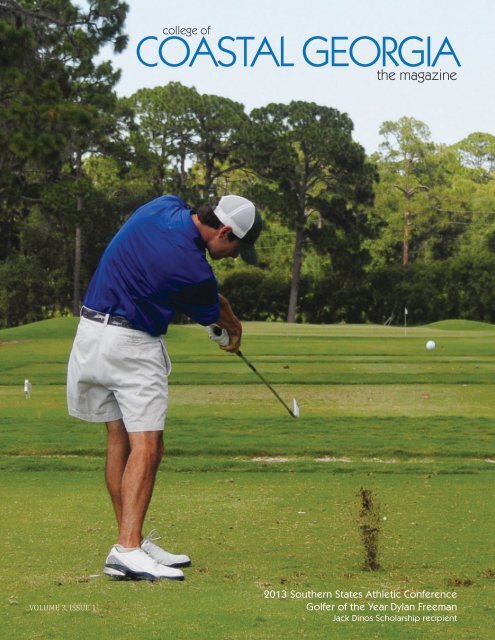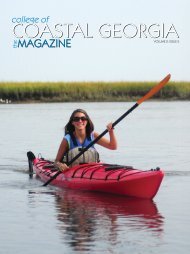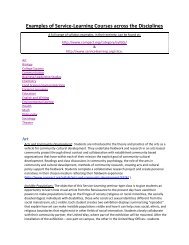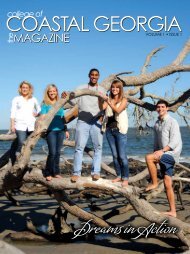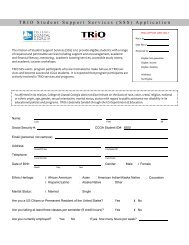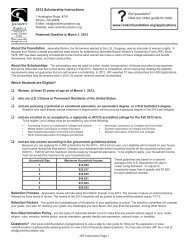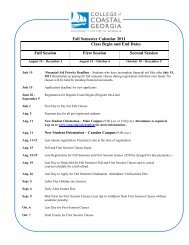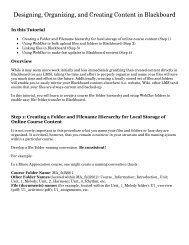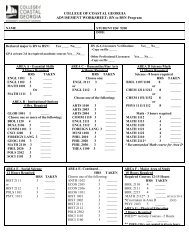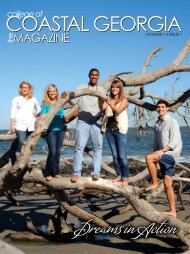College of Coastal Georgia - the Magazine, Volume 3 Issue 1
College of Coastal Georgia - the Magazine, Volume 3 Issue 1
College of Coastal Georgia - the Magazine, Volume 3 Issue 1
- No tags were found...
You also want an ePaper? Increase the reach of your titles
YUMPU automatically turns print PDFs into web optimized ePapers that Google loves.
college <strong>of</strong><strong>Coastal</strong> <strong>Georgia</strong><strong>the</strong> magazineVOLUME 3, ISSUE 12013 Sou<strong>the</strong>rn States Athletic ConferenceGolfer <strong>of</strong> <strong>the</strong> Year Dylan FreemanJack Dinos Scholarship recipient
Game Time!Photo from Baseball game, Game Room or Bishop GateFreshman Rotary International Scholarship recipient Maria Trabanino looks on as Tyler Barber lines up his shot during a game <strong>of</strong>pool in <strong>the</strong> student activity center recreation room. The room opened in April <strong>of</strong> 2013 and includes billiards, air hockey, foosball,card table, ping pong tables, bike rentals and three large flat-screen televisions for gaming, <strong>of</strong>fering <strong>the</strong> students a place to relax andenjoy some friendly competition between classes.
A Message from <strong>the</strong> PresidentDr. Valerie A. HepburnWelcome to <strong>the</strong> latest issue <strong>of</strong> <strong>College</strong> <strong>of</strong> <strong>Coastal</strong><strong>Georgia</strong> – <strong>the</strong> <strong>Magazine</strong>.In <strong>the</strong>se pages, we highlight our newest degree, aBachelor <strong>of</strong> Arts in American Studies. Just as AmericanStudies encompass an interdisciplinary, communitycenteredapproach to understanding <strong>the</strong> critical issuesfacing <strong>the</strong> United States – history, ecology, culture,communications, government, economic developmentand resource sustainability – <strong>the</strong>se pages exploresimilar facets <strong>of</strong> <strong>the</strong> <strong>Coastal</strong> <strong>Georgia</strong> experience.You’ll read about new partnerships with <strong>the</strong> School<strong>of</strong> Business and Public Affairs that will <strong>of</strong>fer excitingopportunities for students to enhance <strong>the</strong>ir career options. We also showcase <strong>the</strong>capstone course for <strong>the</strong> BBA degree which applies 21 st century knowledge and skills toenable classroom entrepreneurs to compete successfully in a global arena.Service-learning continues to take center stage as our signature academic initiative.<strong>Coastal</strong> <strong>Georgia</strong> is winning national recognition and, locally, Burt Brown with Habitatfor Humanity <strong>of</strong> Glynn County describes <strong>the</strong> difference our students make at <strong>the</strong>local level. You’ll also read about five students who traveled to <strong>the</strong> Gulf Coast to seefirsthand - and extend helping hands to - post-Katrina restoration.We are excited to introduce you to successful alumni, new graduates in <strong>the</strong> Class <strong>of</strong>2013 and students engaged in artistic, literary and cultural experiences on campus.Reviewing <strong>the</strong>se milestones causes me to reflect on how quickly five years havepassed during my service as president <strong>of</strong> <strong>Coastal</strong> <strong>Georgia</strong>. The <strong>College</strong> and I havebenefited because <strong>of</strong> tremendous support provided by <strong>the</strong> Board <strong>of</strong> Regents and <strong>the</strong>University System <strong>of</strong> <strong>Georgia</strong>, <strong>the</strong> Foundation trustees, our state elected <strong>of</strong>ficials, <strong>the</strong>local community, faculty, staff, students, and friends <strong>of</strong> <strong>the</strong> <strong>College</strong> – people who saw<strong>the</strong> vision, wrote <strong>the</strong> mission and put this dream into action.Collectively, we share an amazing list <strong>of</strong> accomplishments: collaboration in craftingand successfully implementing a comprehensive strategic master plan, accreditation<strong>of</strong> ten new baccalaureate degree programs, creation <strong>of</strong> new academic schoolswithin <strong>the</strong> <strong>College</strong>, construction <strong>of</strong> new academic buildings and our first on-campusstudent residences, reorganization <strong>of</strong> <strong>the</strong> <strong>College</strong> Foundation, renovation <strong>of</strong> outdatedstructures, addition <strong>of</strong> new athletic programs and facilities, adoption <strong>of</strong> servicelearningas our educational enhancement plan, and cultivation <strong>of</strong> new cultural andarts programming. The magazine itself is one <strong>of</strong> <strong>the</strong> added innovations.These accomplishments have already netted key results. Enrollment has increased.Talented students are now remaining in <strong>the</strong> community - becoming teachers, nurses,leaders and entrepreneurs. Alumni are proud <strong>of</strong> <strong>the</strong>ir award-winning college andbeautiful campus. We’ve become a catalyst for economic development across <strong>the</strong>region. And, <strong>the</strong> Golden Isles is an even better place to live because <strong>of</strong> campuscommunityengagement.This summer I will return to my pr<strong>of</strong>essional field <strong>of</strong> interest, health and publicpolicy. The next issue <strong>of</strong> <strong>the</strong> magazine will introduce <strong>the</strong> fifth president <strong>of</strong> <strong>the</strong> <strong>College</strong><strong>of</strong> <strong>Coastal</strong> <strong>Georgia</strong>. Without question, I’m handing <strong>of</strong>f a successful institution for which<strong>the</strong> sky is <strong>the</strong> limit. I look forward to continuing to support <strong>the</strong> progress <strong>of</strong> <strong>Coastal</strong><strong>Georgia</strong> in <strong>the</strong> coming years.VOLUME 3, ISSUE 1 • May 2013A campus in color........................................................2First Class...................................................................4Rebekah Lindborg..................................................4Tiffany Curry..........................................................5Elizabeth Rackley-DeSalvo......................................6Larry Carter...........................................................7Rolling up her sleeves.................................................8Hottest ticket in town................................................. 10Building a better community..................................... 12Duo making waves nationally................................... 13American Studies....................................................... 14Power Couple............................................................ 17Alternative Spring Break............................................ 18The Writing Center.....................................................20Athletics Updates.......................................................22Put me in coach... ................................................... 24No student left inside................................................26Credit where credit is due..........................................28<strong>College</strong> <strong>of</strong> <strong>Coastal</strong> <strong>Georgia</strong> - <strong>the</strong> <strong>Magazine</strong>is produced by <strong>the</strong> Advancement Office <strong>of</strong> <strong>the</strong><strong>College</strong> <strong>of</strong> <strong>Coastal</strong> <strong>Georgia</strong>, with <strong>the</strong> support <strong>of</strong><strong>the</strong> <strong>College</strong> <strong>of</strong> <strong>Coastal</strong> <strong>Georgia</strong> Foundation.Advancement OfficeElizabeth Wea<strong>the</strong>rly, Chief Advancement OfficerJohn Cornell, Director <strong>of</strong> Marketing and PRJessica Dickson, Coordinator <strong>of</strong> Alumni Services and EventsPaul Hearn, WebmasterRobin Flores, Department CoordinatorPeggy Golden, Staff Writer/Special ProjectsManaging Editor/Layout and DesignJohn CornellEditor/Senior WriterPeggy GoldenEditorial AssistanceRebecca Buchanan ‘14, Kevin Price, Diana LealPhotographyAll photographs by John Cornell unless noted.<strong>College</strong> <strong>of</strong> <strong>Coastal</strong> <strong>Georgia</strong> – <strong>the</strong> <strong>Magazine</strong> 1
2 <strong>College</strong> <strong>of</strong> <strong>Coastal</strong> <strong>Georgia</strong> – <strong>the</strong> <strong>Magazine</strong>Freshman Cameron Griffith, drenchedin color, joined millions <strong>of</strong> Holi Festivalcelebrants around <strong>the</strong> world rejoicing inspring on March 29.
A campus in colorArt Club inspires creative campus activityArt as creative play. Art as different ways for people to express<strong>the</strong>mselves. Art as a break from <strong>the</strong> academic routine. Art as away to become involved on campus. Art as community service.This is <strong>the</strong> art <strong>of</strong> life, as articulated by members <strong>of</strong> <strong>the</strong> campusArt Club, and <strong>the</strong>y want everyone to know that being an art studentis not a requirement for membership. For instance, Chris Smith’15 is a psychology major and Donny Simmons ’16 is focused oncommunications. Charles Poston ’15 has an associate degree in artbut is an education major with a concentration in history. FreshmanCameron Griffith is actually an art student, planning to transfer toSavannah <strong>College</strong> <strong>of</strong> Art and Design after his sophomore year.Poston is currently president <strong>of</strong> <strong>the</strong> club – or master <strong>of</strong> ceremonies,depending on <strong>the</strong> activity – noted for his top hat and magic coat <strong>of</strong>many colors. The club meets weekly.“Our meetings aren’t just art talk,” Smith stressed. “It’s very social –a chance for everyone to meet and interact.”Simmons agreed. “We discuss ideas for big projects, including <strong>the</strong>business aspects. Sometimes we use <strong>the</strong> meeting to create miniprojects.And we’re open to ideas from anyone, not just Art Clubmembers. Artistic endeavors don’t have to be fine art or cultural to bea fun group activity.”To expand <strong>the</strong>ir perspective, <strong>the</strong> club organizes field trips tomuseums such as <strong>the</strong> Jepsen and <strong>the</strong> Telfair in Savannah or <strong>the</strong> HighMuseum and Emory University’s Michael Carlos Museum in Atlanta.Their current objective is a field trip to New York City during springbreak 2014.Poston considers <strong>the</strong> field trips to be invaluable. “Seeing <strong>the</strong> realpieces, we can examine <strong>the</strong> technique and experience <strong>the</strong> art firsthand. It’s a different perspective from photos in a textbook.”“There’s a raw energy that just can’t be captured in a photograph,”Smith said.“Like <strong>the</strong> difference between watching a concert on TV versus live,”Simmons added.Light-hearted energy is what inspires many <strong>of</strong> <strong>the</strong>ir endeavors,such as <strong>the</strong> Holi Festival, a Hindu celebration <strong>of</strong> springtime andcolor held annually for hundreds <strong>of</strong> years. Participants toss specialpowdered dyes to color <strong>the</strong>mselves and each o<strong>the</strong>r. The dyes aremade from flower petals and chalk – non-toxic, biodegradable andorganic. “The Holi Festival celebrates <strong>the</strong> triumph <strong>of</strong> a greater goodover evil,” Griffith explained, “dramatizing happiness and freedom <strong>of</strong>expression.”This year’s inaugural Holi Festival was a collaborative adventureby <strong>the</strong> Art Club and International Club. Members <strong>of</strong> <strong>the</strong> local Hinducommunity also participated.Community service projects have ranged from painting a muralfor Goodwill Industries to renovating and painting <strong>the</strong> Hostel-in-<strong>the</strong>-Forest (a youth hostel south <strong>of</strong> Brunswick that utilizes tree houses andgeodesic domes) and designing costumes and applying makeup for ahaunted house benefitting <strong>the</strong> Marty Lyons Foundation .Art Club members are looking at new activities and collaborationsfor <strong>the</strong> coming year: an exhibit <strong>of</strong> 3-D design models; a tent built fromup-cycled, laminated plastic bags, dubbed “<strong>the</strong> pixilated scientist”; a filmshowing <strong>of</strong> cult-favorites “The Rocky Horror Picture Show” and “Priscilla,Queen <strong>of</strong> <strong>the</strong> Desert”; and concepts for a memorial garden - earthworksthat could become a living memorial, including an herb garden.“To bury grief, you plant a seed,” Poston said s<strong>of</strong>tly. “That could befar-reaching in <strong>the</strong> community.” He would like to collaborate with <strong>the</strong>Biology Club, CHEF and <strong>the</strong> Psychology Club to bring <strong>the</strong> idea to fruition.Jeff LeMieux, Associate Pr<strong>of</strong>essor <strong>of</strong> Fine Art, serves as <strong>the</strong> club’sfaculty adviser. During <strong>the</strong> academic year, members meet informallyevery Friday afternoon at 3:30 p.m. in <strong>the</strong> 2-D art studio on <strong>the</strong> firstfloor <strong>of</strong> <strong>the</strong> C<strong>of</strong>fin Building. uCourtesy <strong>of</strong> <strong>the</strong> art club, Opposite: Bobby HavenTaking a break during an Art Club field trip to Atlanta, pictured l-r, Pr<strong>of</strong>essor Jeff LeMieux and students Shanelle Richardson, Zach Lingerfelt, Charles Poston andCameron Griffith.<strong>College</strong> <strong>of</strong> <strong>Coastal</strong> <strong>Georgia</strong> – <strong>the</strong> <strong>Magazine</strong> 3
First Class<strong>College</strong> celebrates class <strong>of</strong> 2013, <strong>the</strong> first class <strong>of</strong> students who entered <strong>College</strong> <strong>of</strong> <strong>Coastal</strong> <strong>Georgia</strong> as freshman in 2009Rebekah LindborgRebekah Lindborg is passionate about vertebrate zoology –including sharks and o<strong>the</strong>r marine creatures. <strong>Coastal</strong> ecologywas her logical track choice for <strong>the</strong> BS in biology. She is looking atgraduate schools in <strong>the</strong> states <strong>of</strong> <strong>Georgia</strong>, Florida and Washingtonas well as <strong>the</strong> country <strong>of</strong> Australia – schools with programs inanimal behavior and conservation biology and with locations near<strong>the</strong> coast.Her choices seem to contrast with living on 50 acres <strong>of</strong> farmlandin Thalman, <strong>Georgia</strong>, and being home schooled. But when you areregularly moving all over <strong>the</strong> world with your family, traveling toplaces such as Hawaii, Fiji and Australia and living in Europe, homeschooling becomes a necessity.“We lived in Brussels long enough for me to complete 8thgrade in <strong>the</strong> international school and to learn some French,” shesaid. “But <strong>the</strong> home schooling was structured and challenging,with frequent field trips to actually experience <strong>the</strong> art andculture <strong>of</strong> <strong>the</strong> country we were in at <strong>the</strong> time. We frequented <strong>the</strong>libraries, researching topics. The world was our classroom, butcertification required frequent testing and developing good studyhabits.”The family moved to Brunswick for <strong>the</strong> first time in 2000 – andkept returning.“I wanted to go to school in <strong>Georgia</strong>,” Lindborg said. “Igravitated to <strong>Coastal</strong> <strong>Georgia</strong> because it is comfortable, a smallschool with more faculty interaction, in a location I love.” Unlikeher older sister, Ester, who started at <strong>Coastal</strong> <strong>Georgia</strong> in 2003when <strong>the</strong> school was a two-year community college and <strong>the</strong>ntransferred to Armstrong Atlantic, she stayed: “Primarily because<strong>of</strong> <strong>the</strong> one-to-one interaction. I didn’t need to transfer, starting overat a huge campus, when I could get my undergraduate degree inbiology where I really want to be,” she smiled. “The flexibility <strong>of</strong><strong>the</strong> program worked for me. I selected my electives based on myown curiosity and interests.”Her extracurricular activities parallel her interests: BiologyClub, Adopt-a-Wetland, Adopt-a-Highway, and interning at <strong>the</strong><strong>Georgia</strong> Sea Turtle Center.After leaving for graduate school, she’ll still return to campusfrom time to time: her younger bro<strong>the</strong>r, Jedidiah, is a <strong>Coastal</strong><strong>Georgia</strong> sophomore studying criminal justice. <strong>Coastal</strong> <strong>Georgia</strong> hasbecome a Lindborg tradition. uChris Johnson4 <strong>College</strong> <strong>of</strong> <strong>Coastal</strong> <strong>Georgia</strong> – <strong>the</strong> <strong>Magazine</strong>
First ClassTiffany CurryTiffany Curry transferred from <strong>Georgia</strong>Sou<strong>the</strong>rn to <strong>Coastal</strong> <strong>Georgia</strong> midfreshmanyear to be closer to home(Jesup) due to family concerns. Sheplanned a temporary move, but foundherself so in love with <strong>the</strong> school andher business classes, she never lookedback. By <strong>the</strong> end <strong>of</strong> her sophomore year,she expected to be an accountant. As agraduating senior, she’s still excited abou<strong>the</strong>r BBA with a leadership concentration,but her career is shifting to highereducation – <strong>the</strong> business side.“After working as one <strong>of</strong> <strong>the</strong> firstresident assistants in campus housing,I became head resident assistant. Over350 students live in Lakeside Village andI bet I’m in contact with over half <strong>of</strong> <strong>the</strong>mevery day. My job is to make a differencein <strong>the</strong>ir lives – a positive difference in<strong>the</strong>ir campus experience,” she explained.“With my leadership concentration, Ilearned <strong>the</strong> <strong>the</strong>ories and <strong>the</strong>n put <strong>the</strong>minto practice every day as a life coach,supervisor, disciplinarian, mentor, friendand role model.”Curry cites <strong>the</strong> influence <strong>of</strong> Dr. MichaelButcher and Amber Sutor in re-directingher interest. “They are why I’m goingto graduate school. I started workingwith Dr. Butcher in May 2011 to buildour program. After such an incredibleexperience, I’m pursuing a MEd in highereducation while working as a resident halldirector. I have my eye on <strong>the</strong> two-yearprograms because I want to come back to<strong>Coastal</strong> for <strong>the</strong> new residence hall when itis built,” she said.She has been accepted to ArkansasTech, which she described as “what we’llCourtesy <strong>of</strong> Tiffany Currylook like in 10-15 years.” The graduate school <strong>of</strong>fers a work-study programs that will enable herto pursue her degree full time while living and working in one <strong>of</strong> <strong>the</strong> 14 residence halls.“My goal is to have my PhD in higher education by <strong>the</strong> age <strong>of</strong> 30,” she concluded, “and youknow what? Someday I intend to return as president <strong>of</strong> <strong>the</strong> <strong>College</strong> <strong>of</strong> <strong>Coastal</strong> <strong>Georgia</strong>. Right nowI’m all about student housing, but I have this growing interest in public policy.” u<strong>College</strong> <strong>of</strong> <strong>Coastal</strong> <strong>Georgia</strong> – <strong>the</strong> <strong>Magazine</strong> 5
First ClassElizabeth Rackley-DeSalvoElizabeth Rackley-DeSalvo used to think <strong>of</strong> herself as ahigh school dropout. “I was bored, so I dropped out <strong>the</strong>middle <strong>of</strong> my senior year with only two credits to go,” <strong>the</strong>Chandler, Arizona native confessed. “I took a correspondencecourse to complete my high school degree, but I had no plansor money for college.”After moving to <strong>the</strong> east coast and enrolling at <strong>the</strong><strong>College</strong> <strong>of</strong> <strong>Coastal</strong> <strong>Georgia</strong>, Rackley-DeSalvo’s view <strong>of</strong> formaleducation altered dramatically. “By my sophomore year, I hadchanged my mind about majoring in middle grades educationand was thinking about graduate school atColumbia University for journalism and law.I’m passionate about social justice.” But afteran enthusiastic discussion with Dr. Carla Bluhmand learning about <strong>the</strong> BS in psychology, shebegan to ponder research in that discipline.By <strong>the</strong> time she walks in commencement onMay 11, <strong>the</strong> cum laude graduate will alreadyknow her next step. She applied to fourprestigious graduate schools with programsin her area <strong>of</strong> interest – <strong>the</strong> intersection <strong>of</strong>neuroscience and psychology. By April 1 she hadalready been accepted to two <strong>of</strong> those schools,both in New York City: <strong>the</strong> Graduate School<strong>of</strong> Arts and Science at New York Universityand <strong>the</strong> New School <strong>of</strong> Social Research (with aDean’s Merit Scholarship).“Increased funding is now available formapping brain activity. I want to be part <strong>of</strong>that,” she explained. She is fascinated withunderstanding where complex, emotional beliefsystems impacting social phenomenon formand develop in <strong>the</strong> brain.Her preparation, she contended, had moreto do with <strong>the</strong> structure <strong>of</strong> <strong>the</strong> psychologydegree program at <strong>Coastal</strong> <strong>Georgia</strong> than just <strong>the</strong>course work. “I could compete for <strong>the</strong>se gradschools because <strong>of</strong> <strong>the</strong> collaborative nature<strong>of</strong> <strong>the</strong> program here – research, presentingat conferences, mentoring by pr<strong>of</strong>essors andservice learning. I could immerse myself in <strong>the</strong>discipline and really focus.”“I had multiple mentors, which I consideran important factor, and my service-learningexperiences helped refine my objectives. I’ve progressedfrom educating to advocating and <strong>the</strong>n made <strong>the</strong> leap toimpacting through research,” she concluded. She’ll continueusing an electroencephalogram to measure brain activity andperceptions <strong>of</strong> infertility, religion, politics and pornography incollaboration with Dr. Kimberly Kinsey Mannahan, AssistantPr<strong>of</strong>essor <strong>of</strong> Psychology. They plan to submit at least one <strong>of</strong><strong>the</strong>se studies for presentation at <strong>the</strong> Sou<strong>the</strong>ast PsychologicalAssociation annual conference later this year. u6 <strong>College</strong> <strong>of</strong> <strong>Coastal</strong> <strong>Georgia</strong> – <strong>the</strong> <strong>Magazine</strong>
First ClassLarry CarterCourtesy <strong>of</strong> Larry CarterLarry Carter <strong>of</strong> Folkston worked 27 years for UPS– starting in high school – before a knee injurysent him back to school to craft a new career. Since hehad remained involved in sports, coaching and youthprograms at Charlton County High School, teachingseemed like a natural choice for him. He graduates cumlaude this May with a BS in middle grades education.“I had to rethink my life. I assumed I’d be retiring fromUPS some day, but it didn’t happen that way. The past fouryears have been busy. Man, is that an understatement,” hesighed! “But I’ve been dedicated to my education and <strong>the</strong>effort is paying <strong>of</strong>f.”Carter compared notes with his 29-year-old son who isa teacher and coach at Montgomery County High School.“My son attended a different college and said histraining wasn’t as rigorous. He didn’t feel ready for<strong>the</strong> classroom when he graduated. I am. I benefittedfrom all <strong>the</strong> classroom exposure,” he said. He alsopraised <strong>the</strong> cohort system. “The members <strong>of</strong> mycohort have become my extended family – a realsupport network.”Carter opted for middle grades because he likes<strong>the</strong> enthusiasm and teach-ability <strong>of</strong> that age. Hewould also like to coach wrestling, football and track.“I really like sports,” he laughed. “I video and scouto<strong>the</strong>r schools’ games for pre-game review and evendrive <strong>the</strong> team bus if I’m needed. I’ve observed thatkids who become involved in sports are more likelyto stay in school and graduate. And <strong>the</strong>y want <strong>the</strong>irteachers to be involved in extracurricular activitiesand show an interest in what <strong>the</strong>y do beyond <strong>the</strong>classroom. They are very vocal about that. In placeslike Folkston, sports and education are one <strong>of</strong> <strong>the</strong> fewways to discover opportunities - do more than justhang around <strong>the</strong> street corner waiting for somethingto happen.”He stressed <strong>the</strong> importance <strong>of</strong> his studentslearning to use technology and to develop criticalthinking skills. “You can’t get a good job withoutknowing how to use technology and you have tobe able to reason – to think through problems andput toge<strong>the</strong>r solutions. If you can’t figure things outyourself, you’ll be back on that street corner, waitingfor someone to give you an answer. I can help <strong>the</strong>mdo a lot more than that,” he concluded. u<strong>College</strong> <strong>of</strong> <strong>Coastal</strong> <strong>Georgia</strong> – <strong>the</strong> <strong>Magazine</strong> 7
8 <strong>College</strong> <strong>of</strong> <strong>Coastal</strong> <strong>Georgia</strong> – <strong>the</strong> <strong>Magazine</strong>Mark and Lillian Talbert still taketo <strong>the</strong> highway on two wheels.
Courtesy <strong>of</strong> Lillian Prosser TalbertRolling up her sleeves.Alumna <strong>of</strong> <strong>the</strong> Year Lillian Prosser Talbert ’68Alumna Lillian Prosser Talbert ’68 is willing to roll up her sleevesand get <strong>the</strong> job done. That quality is one <strong>of</strong> <strong>the</strong> reasons she wasnamed <strong>Coastal</strong> <strong>Georgia</strong> Alumna <strong>of</strong> <strong>the</strong> Year during <strong>the</strong> Honors Daycelebration on April 26.Elizabeth Wea<strong>the</strong>rly, Chief AdvancementOfficer for <strong>the</strong> <strong>College</strong>, recalls her first lunch withTalbert. “She arrived with an armful <strong>of</strong> papers,archival material about <strong>the</strong> <strong>College</strong> during <strong>the</strong>years she attended as well as information abou<strong>the</strong>r classmates. Having returned to <strong>the</strong> area, shewas enthusiastic about becoming involved againwith <strong>the</strong> campus and volunteered to identify,locate and contact o<strong>the</strong>r alumni – one <strong>of</strong> <strong>the</strong> mosttime-consuming tasks we faced in establishing analumni association. With Lillian’s help, we couldfinally put <strong>the</strong> pieces <strong>of</strong> <strong>the</strong> puzzle toge<strong>the</strong>r andactually launch <strong>the</strong> association.”As a Brunswick Junior <strong>College</strong> studentduring <strong>the</strong> early days <strong>of</strong> <strong>the</strong> school’s founding, Lillian was activelyinvolved on campus – secretary <strong>of</strong> <strong>the</strong> bowling league, The Lion’sTale (college newspaper) staff member, captain <strong>of</strong> <strong>the</strong> inauguralgirls’ intramural basketball team (she had played at Glynn Academy),sophomore class senator for <strong>the</strong> student government association,and Outstanding Sophomore Class Leader (1967). When she finishedher 4th term in December 1967, she was only <strong>the</strong> second woman tohave completed an associate’s degree in business. She went on tocomplete her studies at <strong>Georgia</strong> Sou<strong>the</strong>rn University, graduating in1969 as a business major.“So many <strong>of</strong> us would never have been able to go to college if wehadn’t started here at home,” Talbert says. “We proved we couldmake it, encouraging our families to take <strong>the</strong> next step and allow usto go away to school to finish our degrees.”While living in Statesboro, she played guitar and sang with a folkgroup that entertained <strong>the</strong> military at Fort Stewart and Hunter ArmyAirfield. She met Army Captain Bill Talbert from North Carolina, apilot stationed at Fort Stewart, and <strong>the</strong>y married in 1970.“That began my travels,” she reminisces, “as we moved from<strong>Georgia</strong> to bases in Arizona and North Carolina. After <strong>the</strong> military,Bill completed his B.S. in aeronautical studies and his careers tookus to Tennessee, California, and finally overseas. We lived in Munich,Germany for five years and explored Europe before returning to <strong>the</strong>states with Bill’s transfer to corporate headquarters in Indianapolis.As president <strong>of</strong> Jackson-Lea, Bill became a real globe trotter, but mytraveling had slowed with <strong>the</strong> birth <strong>of</strong> our first son in Munich andstopped with <strong>the</strong> birth <strong>of</strong> our second.”In addition to flying, her husband has a passion for motorcycles.“I have been his passenger on many motorcycle rides throughout <strong>the</strong>United States and Europe. If I were on my own bike, we wouldn’t begoing as fast,” she laughs.Because <strong>of</strong> her multicultural experiences in Europe and <strong>the</strong>impact <strong>of</strong> globalization she witnessed throughout her husband’scareer, Talbert is a strong proponent <strong>of</strong> international studentexchange programs and expanded internationalconnections for <strong>the</strong> <strong>College</strong>. “I am pleased that it ispart <strong>of</strong> <strong>Coastal</strong> <strong>Georgia</strong>’s mission statement,” shesays. “In today’s world, it’s important.”The family settled in <strong>the</strong> Conover-Hickory area<strong>of</strong> North Carolina. With three sons, Talbert becamea soccer mom – and coached soccer, basketball andbaseball for <strong>the</strong> Recreation Department. “My lovefor competitive sports has followed me throughoutmy life,” she notes. “I played competitive clubtennis for 22 years and our family competed at <strong>the</strong>national level in waterskiing for about 12 years. Idrove <strong>the</strong> boat! We were part owners <strong>of</strong> a water skilake, hosting tournaments throughout <strong>the</strong> springand summer, in Harmony, North Carolina.”Initially <strong>the</strong>y retired to North Padre Island, Texas, but decidedto move closer to family and grandchildren. “We were looking foravailable UPS stores on <strong>the</strong> East Coast and found one in Brunswick.So after 43 years <strong>of</strong> living away, I returned home.”She contends that learning and trying new ventures isn’t limitedby age. “We were retired when I went to UPS University to learn howto operate a UPS store. You can be whatever you want to be if you’rewilling to learn new skills. While most <strong>of</strong> my friends are retiring, itseems that I am just beginning,” she laughs.Talbert had remained interested in her hometown alma mater,maintaining ties and visiting family in <strong>the</strong> area. “I would ask if analumni association had been started, but <strong>the</strong>re wasn’t one,” sheexplained. “When we moved back, I wanted to get involved as abooster for <strong>the</strong> <strong>College</strong>’s growth.”Her penchant for history evolved into genealogical researchand an interest in archives. “I love <strong>the</strong> detective work <strong>of</strong> research. Iattribute my saving things, like <strong>the</strong> old Lion’s Tale newspapers and<strong>the</strong> inaugural BJC yearbooks and campus snapshots, to that passion.At <strong>the</strong> time we were attending Brunswick Junior <strong>College</strong>, we didn’treally grasp <strong>the</strong> uniqueness <strong>of</strong> being <strong>the</strong> first – <strong>the</strong> first students,<strong>the</strong> first clubs, <strong>the</strong> first athletes. But in keeping those things, Iaccidentally became a historian. I was part <strong>of</strong> <strong>the</strong> genesis <strong>of</strong> <strong>the</strong><strong>College</strong> <strong>of</strong> <strong>Coastal</strong> <strong>Georgia</strong>.”Talbert became a founding member <strong>of</strong> <strong>the</strong> <strong>College</strong> <strong>of</strong> <strong>Coastal</strong><strong>Georgia</strong> Alumni Association, serving first on <strong>the</strong> Advisory Counciland now as a member <strong>of</strong> <strong>the</strong> leadership group <strong>of</strong> <strong>the</strong> AlumniAssociation. She is <strong>the</strong> association’s membership chair. Whenever avolunteer is needed, from making posters and banners to welcomingstudents at move-in day in Lakeside Village, she is <strong>the</strong>re.She concludes, “One thing I will say with certainty – alumni shouldbe proud <strong>of</strong> this school!” uThe Crest - 1968<strong>College</strong> <strong>of</strong> <strong>Coastal</strong> <strong>Georgia</strong> – <strong>the</strong> <strong>Magazine</strong> 9
The hottest tickets in town...Cultural programing enriches campusTrue to <strong>the</strong> vision <strong>of</strong> serving as a catalyst for culturaldevelopment in <strong>the</strong> Golden Isles, <strong>Coastal</strong> <strong>Georgia</strong> providedoutstanding programs this winter and spring - all new to <strong>the</strong>area - and <strong>the</strong> community is calling for more. The concerts andlive performances filled <strong>the</strong> seats <strong>of</strong> <strong>the</strong> Thomas Auditorium and<strong>the</strong> C<strong>of</strong>fin Gymnasium. Literary and film enthusiasts expressedappreciation for <strong>the</strong> smaller-scale events as well.A generous gift from <strong>the</strong> Julie and Eric Epstein CharitableFoundation established a new concert series, “From <strong>the</strong> City to<strong>the</strong> Golden Isles,” bringing <strong>the</strong> area outstanding talent normallyappearing in New York City.The Ossia Chamber Players, members <strong>of</strong> New York City’s OssiaSymphony Orchestra, played for <strong>the</strong> inaugural series concert onDecember 7 in <strong>the</strong> Thomas Auditorium <strong>of</strong> <strong>the</strong> Sou<strong>the</strong>ast <strong>Georgia</strong>Conference Center on campus. The concert included a guestappearance by internationally-renowned violinist Maestro LuisHaza. Orlando Alonso, artistic director and conductor <strong>of</strong> Ossia, and15 musicians with <strong>the</strong>orchestra played Grieg’sHolberg Suite, Op. 40 andTchaikovsky’s Serenadefor Strings with Haza asCo lege <strong>of</strong> <strong>Coastal</strong> <strong>Georgia</strong> Foundation Presents:Virtuoso and Jazz Journalists Association2011 Guitarist <strong>of</strong> <strong>the</strong> Year...Virtuoso and Jazz Journalists Association2011 Guitarist <strong>of</strong> <strong>the</strong> Year...RUSSELL MALONERUSSELL MALONECo lege <strong>of</strong> <strong>Coastal</strong> <strong>Georgia</strong> Foundation Presents:<strong>the</strong> featured soloist for Bach’s Violin Concerto No. 1 in A minor.In early February, <strong>the</strong> <strong>College</strong> hosted a multi-mediapresentation by actor, author, jazz singer and filmmaker ByronMotley on The Negro Baseball Leagues: An American Legacy in<strong>the</strong> Thomas Auditorium. As an entertainer, Byron Motley hasperformed on Broadway, on stage with <strong>the</strong> Boston Pops Orchestra,and worked with names such as Natalie Cole, Celine Dion, BarryManilow, Barbra Streisand and Dionne Warwick. He co-authoredRuling Over Monarchs, Giants and Stars: True Tales <strong>of</strong> BreakingBarriers, Umpiring Baseball Legends, and Wild Adventures in <strong>the</strong>Negro Leagues (Skyhorse/Sports Publishing, February 2012) withhis fa<strong>the</strong>r, Bob Motley, who was an umpire in <strong>the</strong> League betweenAdmit One - $25.00Admit One - $25.00Brough to you through <strong>the</strong> generosity <strong>of</strong> <strong>the</strong>Julie and Eric Epstein Foundation:From <strong>the</strong> City to <strong>the</strong> Golden IslesBrough to you through <strong>the</strong> generosity <strong>of</strong> <strong>the</strong>Julie and Eric Epstein Foundation:February 21 - 6:30 p.m.February 21 - 6:30 p.m.From <strong>the</strong> City to <strong>the</strong> Golden IslesSou<strong>the</strong>ast <strong>Georgia</strong> Conference CenterTerri l Thomas AuditoriumCo lege <strong>of</strong> <strong>Coastal</strong> <strong>Georgia</strong>Terri l Thomas AuditoriumCo lege <strong>of</strong> <strong>Coastal</strong> <strong>Georgia</strong>Sou<strong>the</strong>ast <strong>Georgia</strong> Conference CenterMembers <strong>of</strong> <strong>the</strong> Ossia Chamber Players opened <strong>the</strong> new concert series, “From <strong>the</strong> City to <strong>the</strong> Golden Isles.”10 <strong>College</strong> <strong>of</strong> <strong>Coastal</strong> <strong>Georgia</strong> – <strong>the</strong> <strong>Magazine</strong>
COLLEGE <strong>of</strong> COASTAL GEORGIA PRESENTS<strong>the</strong> mid-1940s and 50s. His fa<strong>the</strong>r called<strong>the</strong> balls and strikes <strong>of</strong> such legendaryNegro League players as Hank Aaron,Ernie Banks, Willie Mays and SatchelPaige.Biographer Penelope Niven, author<strong>of</strong> Thornton Wilder: A Life, was one<strong>of</strong> <strong>the</strong> featured speakers for <strong>Coastal</strong><strong>Georgia</strong>’s celebration <strong>of</strong> The BigRead. The book selection for <strong>the</strong>community’s 2013 Big Readfeatured Wilder’s novel, TheBridge <strong>of</strong> San Luis Rey, and hisplay, Our Town, both Pulitzer Prize winners.All <strong>of</strong> The Big Read campus programs were free.Step Afrika!, a pr<strong>of</strong>essional dance company headquarteredin Washington, DC, rocked <strong>the</strong> walls <strong>of</strong> <strong>the</strong> C<strong>of</strong>fin Gymnasiumon February 15. The company began in 1994 as a cross-culturalexchange program with <strong>the</strong> Soweto Dance Theatre <strong>of</strong> Johannesburg,South Africa. Their first full production in January 2000 was asold-out run at <strong>the</strong>Kennedy Center for<strong>the</strong> Performing Artsin Washington, DC, aspart <strong>of</strong> <strong>the</strong> ImaginationCelebration. Now<strong>the</strong> ensemble tours<strong>the</strong> U.S. annually, aswell as performinginternationally andon <strong>the</strong> stages <strong>of</strong> <strong>the</strong>Kennedy Center, <strong>the</strong>Lincoln Center inNew York City, andat <strong>the</strong> White House.The dance tradition<strong>of</strong> stepping, whichsprang from song anddance rituals practicedby African-Americancollege fraternities andsororities in <strong>the</strong> earlyFEBRUARY 15, 2013COFFIN GYM AT 8 PMTICKETS AVAILABLE THROUGHTHE LIGHTHOUSE BOOKSTORE:Phone Orders: 912-279-5972In Person: One <strong>College</strong> DriveBrunswick, <strong>Georgia</strong>TICKETS AVAILABLE ONLINE,www.ccgabooks.comPUBLIC TICKETS $10FACULTY & STAFF TICKETS $5STUDENTS ARE FREE WITH CCGA IDTICKETS AVAILABLEAT THE DOOR AT 7PM20th century, uses <strong>the</strong> human body as an instrument to createstunning rhythms and sounds by combining footsteps, claps andspoken words.Jazz guitarist Russell Malone headlined <strong>the</strong> second “From <strong>the</strong> Cityto <strong>the</strong> Golden Isles” concert in late February. Born in Albany, <strong>Georgia</strong>,Malone began playing onstage in Atlantaduring 1986 with organist Jimmy Smith.He’s played on NPR and appeared inRobert Altman’s 1996 movie, KansasCity. He’s been a member <strong>of</strong> <strong>the</strong> HarryConnick Jr. Big Band; played on five albumswith Diana Krall, including three Grammynominatedalbums, and toured <strong>the</strong> worldwith her; and worked with such well-knownnames as Ron Carter (Golden Striker Trio),Branford Marsalis, B.B. King, Roy Hargrove,Benny Green, Ray Brown, Bill Frisell, ShirleyHorn, Christina Aguilera, David Sanborn, ArethaFranklin, Sonny Rollins and Natalie Cole – to namejust a few.Bassist Daryl Johns appeared with Maloneas his accompanist. Johns was a member <strong>of</strong> <strong>the</strong> 2012 TheloniousMonk National High School All-Star Jazz Sextet and was featuredas WBGO 88.3FM Jazz Star <strong>of</strong> Tomorrow at <strong>the</strong> 2011 Champions <strong>of</strong>Jazz benefit at Lincoln Center. In 2010, he was one <strong>of</strong> 30 high schoolstudents from across <strong>the</strong>U.S. selected by <strong>the</strong> GrammyFoundation to participatein <strong>the</strong> prestigious GrammyJazz Ensemble program.Johns’ composition, Toysfor Roy, was winner <strong>of</strong> <strong>the</strong>2010 Downbeat <strong>Magazine</strong>student music award forbest original song. As part<strong>of</strong> a <strong>College</strong>-sponsoredoutreach program, Johnsconducted an interactivebass workshop with local<strong>Coastal</strong> Youth Symphonymusicians during his visit.Campus organizationslaunched an internationalfilm festival in mid-April,free to <strong>the</strong> general public,showing titles from Brazil,France, Great Britain andSweden at <strong>the</strong> Stembler Theatre. Community members listed filmfestivals as a cultural enhancement <strong>the</strong> <strong>College</strong> could potentiallyprovide in research conducted during 2011 for <strong>the</strong> <strong>College</strong>Foundation-sponsored report <strong>of</strong> <strong>the</strong> Planning Committee forCultural, Arts and Lifelong Learning Programs. uMusic flowed like water from <strong>the</strong> strings <strong>of</strong> his guitar as Russell Malone playedworld-class jazz to a packed auditorium for <strong>the</strong> second concert “From <strong>the</strong> Cityto <strong>the</strong> Golden Isles.”<strong>College</strong> <strong>of</strong> <strong>Coastal</strong> <strong>Georgia</strong> – <strong>the</strong> <strong>Magazine</strong> 11
Building a better community...one class at a time.In an announcement made on March 4 at <strong>the</strong> AmericanCouncil on Education annual conference in Washington, DC,<strong>the</strong> Corporation for National and Community Service included<strong>the</strong> <strong>College</strong> <strong>of</strong> <strong>Coastal</strong> <strong>Georgia</strong> in <strong>the</strong> 2013 President’s HigherEducation Community Service Honor Roll.According to <strong>the</strong> notification received by Dr. Phillis George,director <strong>of</strong> <strong>the</strong> <strong>College</strong>’s Center for Service-Learning & CommunityEngagement, <strong>the</strong> Honor Roll “recognizes higher educationinstitutions that reflect <strong>the</strong> values <strong>of</strong> exemplary community serviceand meaningful outcomes in <strong>the</strong>ir communities.” Selection isrecognition from <strong>the</strong> highest level <strong>of</strong> <strong>the</strong> <strong>College</strong>’s commitment toservice and community engagement.The application submitted by <strong>the</strong> <strong>College</strong>’s Center forService-Learning & Community Engagement focused on generalcommunity service initiatives, according to Dr. George. Projectslisted included CCGA Builds with Habitat for Humanity, a campuswideengagement project; <strong>the</strong> <strong>Coastal</strong> Emergency ManagementProject, an environment management system implemented andmade possible by a summer 2012 Coca-Cola Bin Grant from <strong>the</strong>Coca-Cola Foundation and Keep America Beautiful; and <strong>the</strong> <strong>Coastal</strong>Beach Sweeps on Jekyll Island, partnering with <strong>the</strong> Jekyll IslandAuthority, Keep Brunswick-Golden Isles Beautiful and <strong>the</strong> <strong>Coastal</strong>Regional Commission <strong>of</strong> <strong>Georgia</strong>.The <strong>College</strong> beach sweeps in 2011 and 2012 bagged over1,000 pounds <strong>of</strong> debris on<strong>the</strong> Jekyll Island beach. Thisyear, <strong>College</strong> students, faculty,staff and friends teamed for<strong>the</strong> annual Jekyll Island serviceproject, but instead <strong>of</strong> <strong>the</strong> beach,<strong>the</strong>y tackled <strong>the</strong> trash along<strong>the</strong> causeway and marsh at<strong>the</strong> request <strong>of</strong> <strong>the</strong> Jekyll IslandAuthority, Andrew Smith,Director <strong>of</strong> Student Activities, noted.Launched on January 21 as part <strong>of</strong> <strong>the</strong> Martin Lu<strong>the</strong>r King Jr.Day <strong>of</strong> Service commemoration, CCGA Builds was a<strong>College</strong>-sponsored construction project with Habitatfor Humanity <strong>of</strong> Glynn County. During spring term2013, <strong>College</strong> students, faculty, staff and friends,including a group <strong>of</strong> West Virginia Wesleyan studentson alternative spring break, built two new safe andaffordable homes on adjacent Blain Street lots in <strong>the</strong>neighborhood across Altama Avenue, within walkingdistance <strong>of</strong> <strong>the</strong> campus. The Center and <strong>the</strong> Office<strong>of</strong> Student Life worked toge<strong>the</strong>r to coordinate <strong>the</strong>project and recruit volunteers on and <strong>of</strong>f campus.“The involvement <strong>of</strong> CCGA in our most recentbuilding project was great and made a very positiveimpact in countless ways,” Bert Brown, executivedirector <strong>of</strong> Habitat for Humanity <strong>of</strong> Glynn County,recounted. “With over 150 volunteers from <strong>the</strong><strong>College</strong> we were able to stay on <strong>the</strong> project planto complete two homes in <strong>the</strong> short span <strong>of</strong> threemonths. The efforts <strong>of</strong> <strong>the</strong> athletic teams, clubs andorganizations, students, faculty, and staff made thisproject a real joy for all, especially our constructionsupervisor and our regular volunteers. But that’s not all – <strong>the</strong><strong>College</strong> extended <strong>the</strong> invitation to its community partners, such asCommunities in Schools and United Way Young Leaders Society, inthis building project.”“One <strong>of</strong> <strong>the</strong> complementary impacts <strong>of</strong> this partnership was <strong>the</strong>additional leadership support that we received. Working closelywith Dr. Hepburn, Dr. George, Cody Cocchi and Andrew Smith was aspecial experience. We cannot thank <strong>the</strong>m enough for <strong>the</strong>ir capableand encouraging leadership in connection with this project.”“The impact on <strong>the</strong> homeowners was heartfelt,” Brown said.”They were amazed at how many volunteers were willing to give<strong>the</strong>ir time to help with <strong>the</strong> construction. The son <strong>of</strong> one <strong>of</strong> <strong>the</strong>Courtesy <strong>of</strong> Student Activities12 <strong>College</strong> <strong>of</strong> <strong>Coastal</strong> <strong>Georgia</strong> – <strong>the</strong> <strong>Magazine</strong>
new homeowners told me one Saturday that he had never livedin a house made out <strong>of</strong> wood. I told him that it is much morethan a house made out <strong>of</strong> wood. It is a home built with <strong>the</strong> caringsupport <strong>of</strong> volunteers who want to make our community a betterplace to live and want to see young people like him have all <strong>the</strong>opportunities that living in a safe, decent and stable home canbring to him and generations to follow.”Summing it up, Brown declared, “CCGA Builds - homes andcreates rewarding experiences that transforms lives!”“Inclusion on <strong>the</strong> Honor Roll is indeed <strong>the</strong> pinnacle for anengaged campus. In our first year <strong>of</strong> application, <strong>the</strong> <strong>College</strong> <strong>of</strong><strong>Coastal</strong> <strong>Georgia</strong> joined this elite group,” <strong>College</strong> President ValerieHepburn said. “Only seven o<strong>the</strong>r University System <strong>of</strong> <strong>Georgia</strong>institutions earned membership on <strong>the</strong> national Honor Roll.“The quality and quantity <strong>of</strong> community service and civicengagement are key criteria in <strong>the</strong> selection process. Our smallinstitution stands toe-to-toe with much larger and better resourceduniversities,” she said, expressing particular thanks to <strong>the</strong> St. MarysUnited Methodist Church Foundation for its financial support <strong>of</strong><strong>the</strong> <strong>College</strong>’s vision and work in service-learning. “The real awardgoes to our wonderful students and <strong>the</strong> myriad services <strong>the</strong>y haveprovided across <strong>Coastal</strong> <strong>Georgia</strong>.” u<strong>College</strong> GLO-BUS duo making waves nationally<strong>Coastal</strong> <strong>Georgia</strong> student team, Roger Charnock andA Jean Daniell, earned a Global Top 100 ranking for <strong>the</strong>irperformance as part <strong>of</strong> an online business simulation. Within twoweeks <strong>of</strong> starting <strong>the</strong> simulation as a team, <strong>the</strong>y tied for 26th bestworldwide during mid-February in overall game-to-date score andhave continued <strong>the</strong>ir competitive position.Dr. Graeme Coetzer, Associate Pr<strong>of</strong>essor <strong>of</strong> Management, School<strong>of</strong> Business and Public Affairs, introduced <strong>the</strong> organizationalstrategy simulation, GLO-BUS, in <strong>the</strong> capstone class for <strong>the</strong> BBAdegree in fall term 2012. According to Dr. Coetzer, <strong>the</strong> simulationis used by universities and companies around <strong>the</strong> world, requiringstudent and corporate teams to compete in running a globalmanufacturer and retailer <strong>of</strong> digital cameras.Jean Daniell and Roger Charnock are <strong>Coastal</strong>’s daunting duo in abusiness strategy simulation program.Four measures are used in compiling team position: overallscore for <strong>the</strong> current year, earnings per share, return on averageequity and stock price.Charnock and Daniell, both seniors, had never worked toge<strong>the</strong>rprior to <strong>the</strong> class. They didn’t even start <strong>the</strong> class as a team, <strong>the</strong>yexplained, but were in two gender-based teams <strong>of</strong> four studentseach. After <strong>the</strong> first week <strong>of</strong> class, Dr. Coetzer mixed <strong>the</strong> teamsup, announcing <strong>the</strong> equivalent <strong>of</strong> a corporate spin-<strong>of</strong>f and pairingCharnock and Daniell.For Charnock, a non-traditional student, <strong>the</strong> simulation wassimilar to what he had done in retail sales for over 30 years, butwith additional complexity. “We determine <strong>the</strong> grade <strong>of</strong> camera,manufacturing costs, market and selling price. The simulation sets<strong>the</strong> scenarios. We compare what o<strong>the</strong>r companies in <strong>the</strong> programare doing. Then we predict and respond. Each week we have adecision to make. We can easily spend 20 hours every week justtweaking our variables and running <strong>the</strong> models to check results.”Daniell’s interest is marketing. Her skill is thinking outside <strong>the</strong>box, looking for new angles, probing <strong>the</strong> risks and what-ifs. Goinggreen was her idea, which changed <strong>the</strong> image <strong>of</strong> <strong>the</strong>ir products andincreased demand at <strong>the</strong> retail outlets built into <strong>the</strong> simulation.She described <strong>the</strong> project as “building a castle out <strong>of</strong> a tree house”and extolled <strong>the</strong> immediacy <strong>of</strong> seeing <strong>the</strong> impact marketingdecisions make. “The simulation is very visual and <strong>the</strong> realism isvital. With this class, all my o<strong>the</strong>r courses have finally added up toan ‘aha!’ I can see it. I get it.”“It’s as close to real life as you can get,” Charnock agreed. Nowworking as a co-op student with FLETC, he is beginning his newcareer in procurement as a contract specialist with <strong>the</strong> goal <strong>of</strong>becoming an analyst.In addition to gaining invaluable experience, Daniell relishedcompeting successfully against much bigger schools.“They demonstrate that our students are capable <strong>of</strong> competingwith <strong>the</strong> best and brightest around <strong>the</strong> world,” Dr. Coetzer said. u<strong>College</strong> <strong>of</strong> <strong>Coastal</strong> <strong>Georgia</strong> – <strong>the</strong> <strong>Magazine</strong> 13
Bachelor <strong>of</strong> ArtsAmerican Studies<strong>Coastal</strong> <strong>Georgia</strong> becomes <strong>the</strong> first school in <strong>the</strong> University System <strong>of</strong><strong>Georgia</strong> to <strong>of</strong>fer a Bachelor <strong>of</strong> Arts in American Studiesf <strong>the</strong>re are four things I love, <strong>the</strong>y are history, politics,“Iwriting and arguing. American Studies takes all that andwraps it in a convenient package that promises a great careerwith those four things included,” freshman Nate Smith <strong>of</strong>Brunswick said, describing his interest in <strong>Coastal</strong> <strong>Georgia</strong>’snewest degree program.<strong>Coastal</strong> <strong>Georgia</strong> will be <strong>the</strong> first school in <strong>the</strong> UniversitySystem <strong>of</strong> <strong>Georgia</strong> to <strong>of</strong>fer a Bachelor <strong>of</strong> Arts in American Studies.The Board <strong>of</strong> Regents <strong>of</strong> <strong>the</strong> USG approved <strong>the</strong> new baccalaureateprogram in March for <strong>the</strong> School <strong>of</strong> Arts and Sciences.“Given <strong>the</strong> rich historical and natural resources <strong>of</strong> ourcommunities, <strong>the</strong> American Studies degree is a perfect fit for<strong>Coastal</strong> <strong>Georgia</strong>. We are honored to become one <strong>of</strong> more than300 top-ranking colleges and universities across <strong>the</strong> country to<strong>of</strong>fer this signature degree. And, we are thrilled to be <strong>the</strong> ‘firstand only’ in <strong>Georgia</strong>’s public university system!” said <strong>College</strong>President Valerie A. Hepburn.American Studies is a gateway (bachelor’s) degree,syn<strong>the</strong>sizing popular areas <strong>of</strong> study into a coherent, robustprogram. As <strong>the</strong> inaugural Bachelor <strong>of</strong> Arts degree, it provides amarketable outcome for philosophy, English, communications,history, political science, art or sociology majors in <strong>the</strong> socialsciences and <strong>the</strong> arts and humanities departments <strong>of</strong> <strong>the</strong> School<strong>of</strong> Arts and Sciences. Not only could <strong>the</strong> program provide a prelawcourse <strong>of</strong> study, for example, but it also provides a strongoption for many liberal arts and social science majors who wishto remain at <strong>Coastal</strong> <strong>Georgia</strong> to complete <strong>the</strong>ir undergraduateeducation.The American Studies degree will <strong>of</strong>fer two areas <strong>of</strong>concentration: Environmental and Regional Studies (ERS) andCultural Studies and Communication (CSC).The two main components <strong>of</strong> <strong>the</strong> program are 60 credit hours<strong>of</strong> required common core curriculum followed by 60 programhours that immerse students in <strong>the</strong> critical issues facing <strong>the</strong>United States. The rich opportunities for service-learning <strong>of</strong>feredby <strong>the</strong> coastal region significantly enhance <strong>the</strong> program. Studentsin <strong>the</strong> ERS track will benefit directly from proximity to <strong>the</strong> coastalecosystem that is also a major transportation and shippingcorridor. The acquisition <strong>of</strong> Cannon’s Point by <strong>the</strong> St. SimonsLand Trust provides unique field-learning resources. Students in<strong>the</strong> CSC track will draw on <strong>the</strong> art, literary and cultural resources<strong>of</strong> <strong>the</strong> barrier islands, ranging from regional literary and artistic14 <strong>College</strong> <strong>of</strong> <strong>Coastal</strong> <strong>Georgia</strong> – <strong>the</strong> <strong>Magazine</strong>
esources to <strong>the</strong> Gullah-Geechee culture and a wide range <strong>of</strong>historic preservation, museum and archival settings.“The degree provides an interdisciplinary, communitycenteredapproach to understanding history, ecology, economicdevelopment, and resource sustainability, which can be studiedright here in a region steeped in tourism, industry and globaltrade. We are well-positioned to create this 21st century degreewhich prepares students for a variety <strong>of</strong> careers in management,technical writing, journalism, diplomatic service, law, archival/museum studies, emerging media, and ‘green’industries,” Dr. Hepburn said.Dr. Robert Bleil, Assistant Pr<strong>of</strong>essor<strong>of</strong> English in <strong>the</strong> Department <strong>of</strong> Arts andHumanities, elaborated: “American Studiesallows faculty to collaborate across traditionaldisciplinary lines—in <strong>the</strong> case <strong>of</strong> <strong>the</strong>environmental writing course, for example,that combines topics and approaches inanthropology, biology, ecology, English, history,political science and sociology—and allows <strong>the</strong><strong>College</strong> to respond to <strong>the</strong> changing needs <strong>of</strong><strong>the</strong> local, regional, national and internationalcommunities.”“With our recent purchases <strong>of</strong> Cannon’sPoint, we are especially positioned to cooperatewith students who are pursuing this degree,”Ben Slade, executive director <strong>of</strong> <strong>the</strong> St. Simonsland Trust, wrote in October, supporting <strong>the</strong>American Studies program development.“Opportunities for service learning abound in<strong>the</strong> plans we have for Cannon’s Point.”Spud Woodward, director <strong>of</strong> <strong>the</strong> <strong>Coastal</strong>Resources Division <strong>of</strong> <strong>the</strong> <strong>Georgia</strong> Department<strong>of</strong> Natural Resources, cited <strong>the</strong> need for askilled, competent workforce for <strong>the</strong> DNR ando<strong>the</strong>r state and federal agencies involved incoastal management. “We have particular need<strong>of</strong> individuals who can syn<strong>the</strong>size a variety <strong>of</strong>information into a coherent body <strong>of</strong> knowledgeto inform conservation policymaking. Mostimportantly, <strong>the</strong>se individuals must be ableto effectively communicate this knowledgeto policymakers and <strong>the</strong> general public,” hewrote.”I anticipate <strong>the</strong> proposed programproducing such individuals.”Hea<strong>the</strong>r Heath, a pr<strong>of</strong>essional actress andexecutive director <strong>of</strong> Golden Isles Arts andHumanities, agreed in <strong>the</strong> letter she wrote. “Forour own region <strong>of</strong> <strong>Georgia</strong>, we are steeped inenvironmental, historic and cultural resources.Graduates from this new degree program may look no fur<strong>the</strong>r thanGlynn County for opportunities to start <strong>the</strong>ir careers as employershere are always on <strong>the</strong> lookout for individuals with <strong>the</strong> skill sets<strong>the</strong> American Studies program can provide.”Smith wants to become a music critic. “I take music veryseriously. I enjoy listening to practically every genre, I talk nonstopabout music, and above all I enjoy being cynical and snarky.American Studies provides different written opinions in prosethrough its studies <strong>of</strong> African American, Sou<strong>the</strong>rn, and women’sHistoric assets on Cannons Point include shell middens dating back to 2500 B.C., ruins <strong>of</strong>John Couper’s original plantation residence built in <strong>the</strong> 1800s, and slave quarters from <strong>the</strong>antebellum period.Courtesy <strong>of</strong> St. Simons Land Trust<strong>College</strong> <strong>of</strong> <strong>Coastal</strong> <strong>Georgia</strong> – <strong>the</strong> <strong>Magazine</strong> 15
American Studies“American Studies graduates are highlyvalued by employers in both <strong>the</strong> publicand <strong>the</strong> private sector for <strong>the</strong> skillsand approaches that <strong>the</strong>y bring to <strong>the</strong>workforce.”—Dr. Robert Bleil, Assistant Pr<strong>of</strong>essor <strong>of</strong> EnglishDepartment <strong>of</strong> Arts and Humanitiesliterature programs. This broadens <strong>the</strong> scope <strong>of</strong> opinion andallows different ways to approach all brands <strong>of</strong> writing. AmericanStudies is a great way to explore opinions so I can add my own.”Sophomore Byron Anderson, a Camden County High Schoolgraduate, wants to combine his interest in music, films andfoundations. “The fact that <strong>the</strong> new degree will enable me tocontinue to study communications and <strong>the</strong> broad fields <strong>of</strong> studywithin <strong>the</strong> degree are what interest me,” he explained. ”I want towork in <strong>the</strong> field <strong>of</strong> entertainment, specifically music and film,but I ultimately want to use music and film as platforms to startawareness and support foundations. I would use <strong>the</strong> interculturalknowledge, <strong>the</strong> communication and <strong>the</strong> writing skills that I gainfrom <strong>the</strong> degree to better enhance my chances <strong>of</strong> making mydream a reality.”“In order for me to be taken seriously, especially in <strong>the</strong> businessand corporate world, I have to be able to understand o<strong>the</strong>rs, knowhow to communicate with o<strong>the</strong>rs, and be able to express andarticulate my thoughts and plans intelligently, and I believe thisdegree…can be a door <strong>of</strong> opportunity for me,” Anderson summarized.Woody Woodside, President <strong>of</strong> <strong>the</strong> Brunswick-Golden IslesChamber <strong>of</strong> Commerce, would probably agree with Anderson’sassessment. In a letter <strong>of</strong> support for <strong>the</strong> program, he wrote:“The new degree program will also foster <strong>the</strong> development <strong>of</strong>future community leaders who will possess strong written,oral, analytical, and problem-solving skills to be successful andproductive in a variety <strong>of</strong> job sectors.”“American Studies graduates are highly valued by employersin both <strong>the</strong> public and <strong>the</strong> private sector for <strong>the</strong> skills andapproaches that <strong>the</strong>y bring to <strong>the</strong> workforce,” echoed Dr.Bleil.“In addition to finely honed analytical and communication skills,American Studies graduates are trained to approach problemscomprehensively; thus <strong>the</strong>y are adept at bring constituentstoge<strong>the</strong>r to solve problems efficiently.”Dana Haza, former senior regional manager for <strong>the</strong> <strong>Georgia</strong>Center for Nonpr<strong>of</strong>its, noted in December that <strong>the</strong> Center’sresearch and experience led to <strong>the</strong> conclusion that <strong>the</strong> nonpr<strong>of</strong>itsector had a vacancy <strong>of</strong> educated, developed leaders. “The needis immediate and vast,” she wrote. “A 21st century leader <strong>of</strong>a charitable organization needs to have a sound educationalfoundation. With <strong>the</strong> two tracks <strong>of</strong> Environmental and RegionalStudies (ERS) and Cultural Studies and Communication (CSC)students will be able to draw on <strong>the</strong>ir own community as sphere <strong>of</strong>learning. Such a degree would provide this balanced educationalapproach.” Haza currently serves as president and CEO <strong>of</strong> <strong>the</strong>United Way <strong>of</strong> <strong>Coastal</strong> <strong>Georgia</strong>.“Service-learning is a critical component <strong>of</strong> this kind <strong>of</strong>program because it allows students to gain real-world experiencein analysis and problem-solving, and it streng<strong>the</strong>ns crucial tiesbetween <strong>the</strong> <strong>College</strong> and <strong>the</strong> community,” Dr. Bleil concluded.“Service-learning partnerships create creative opportunities for<strong>the</strong> community, and students build <strong>the</strong> community and industryconnections that will launch <strong>the</strong>ir careers.” u16 <strong>College</strong> <strong>of</strong> <strong>Coastal</strong> <strong>Georgia</strong> – <strong>the</strong> <strong>Magazine</strong>
Power CoupleDuane and Carol Harris, volunteers <strong>of</strong> <strong>the</strong> yearAlumna Carol Thomas Harris ’75 and Foundation trusteeDuane Harris are <strong>the</strong> power couple most likely to be foundvolunteering on campus. Groundbreakings, athletic games, ribboncuttings, concerts, commencement, meetings, receptions, servicedays and even <strong>the</strong> Regents’ Awards for Excellence in Educationblack-tie gala in Atlanta – <strong>the</strong>y are <strong>the</strong>re to represent or work onbehalf <strong>of</strong> <strong>the</strong> <strong>College</strong>.They were recognized for <strong>the</strong>ir efforts during Honors Day onApril 26.Carol graduated with an associate in psychology from <strong>Coastal</strong>(<strong>the</strong>n Brunswick Junior <strong>College</strong>), going on to UGA for her BA and<strong>Georgia</strong> Sou<strong>the</strong>rn for her MEd in psychology. “My parents werefrom Glynn County. My dad was in <strong>the</strong> Navy, so we lived all over.I was a high school junior in Hawaii when he received orders forGlynco, so I completed my senior year at Brunswick High School.With college, everyone was starting over, so I had an opportunityto make friends. I was into everything – <strong>the</strong> year book, drama club,and anything else that was fun. Even as a commuter college, wehad a recreation center and a very active student life,” she recalled.Duane was also from a military family; his dad was with ArmyAir Corps counter intelligence, which became <strong>the</strong> Air Force Office<strong>of</strong> Special Investigations. “I was born in Illinois, lived in Japanduring <strong>the</strong> Korean War, spent second grade in San Antonio, wasin Denver until my sophomore year, <strong>the</strong>n Guam, <strong>the</strong>n back toColorado, where I got my BS in biological science and fisheriesfrom Colorado State. In Guam, when I wasn’t in class, I was in <strong>the</strong>water. I think I was always destined to live on an island. My shellcollection is mostly from Guam, but some <strong>of</strong> my most significantfinds – like <strong>the</strong> wooly mammoth tooth – are from local dives.”With water and wea<strong>the</strong>r in mind, Duane applied for his first job- <strong>the</strong> <strong>Georgia</strong> Department <strong>of</strong> Natural Resources. He started in July1970 and remained with <strong>the</strong>m until he retired in 2002. Now heowns Sea <strong>Georgia</strong> Adventures, a charter fishing and environmentalconsulting company.Originally Duane’s ties to <strong>the</strong> <strong>College</strong> stemmed from teachingdiving with Buddy Harris when <strong>the</strong> current weight room in <strong>the</strong>C<strong>of</strong>fin Building was a pool instead. He was recruited to serve on<strong>the</strong> Foundation Board <strong>of</strong> Trustees for <strong>the</strong> community college byDr. Dorothy Lord, <strong>the</strong> president, serving as chairman <strong>the</strong> last twoyears <strong>of</strong> her term. “I was all set to transition <strong>of</strong>f. Fat chance,” helaughed. Instead, he became involved in <strong>the</strong> restructuring, chairing<strong>the</strong> steering committee for <strong>the</strong> <strong>College</strong>’s strategic master plan,2020 Vision: A Decade and Beyond (May 2009). “That was a greatexperience – probably my favorite time – as we envisioned <strong>the</strong>future and what <strong>the</strong> <strong>College</strong> could become,” he said.Carol recalled that Dr. Lord had expressed interest in startingan alumni group, but <strong>the</strong> idea never seemed to take <strong>of</strong>f. “Then Dr.Hepburn recruited Glenn Carson ’80. Glenn knew my family; herecruited me for <strong>the</strong> Alumni Advisory Committee. Now <strong>the</strong> AlumniAssociation keeps growing!”They have a long list <strong>of</strong> reasons for why <strong>Coastal</strong> <strong>Georgia</strong> hasbecome such a special school. “Students don’t have to go away.They can get a wonderful, quality education right here,” Carolstressed.“People are starting to get it,” Duane added. “<strong>Coastal</strong> <strong>Georgia</strong>is a community resource – much more so now than it was as acommunity college. This isn’t about just educating your kids. Thisis for <strong>the</strong> region, enriching all our lives.”Their <strong>College</strong> volunteerism stems from a sense <strong>of</strong> duty andresponsibility. “That’s <strong>the</strong> mantra for any oldest child in a militaryfamily – which we both are,” Duane quipped, “but volunteering for<strong>the</strong> <strong>College</strong> is also lots <strong>of</strong> fun!”They would like to begin ratcheting down. Travel is <strong>the</strong> lure –Australia, New Zealand. “Time to really retire,” Duane concluded,“so I can dive <strong>the</strong> Great Barrier Reef.”u<strong>College</strong> <strong>of</strong> <strong>Coastal</strong> <strong>Georgia</strong> – <strong>the</strong> <strong>Magazine</strong> 17
Alternative Spring Breaknot just a trip to <strong>the</strong> beach(l-r) Karen Price, Holli Perry, Jamie Junot, Danielle Martin and Arron CampbellFive <strong>Coastal</strong> <strong>Georgia</strong> upperclassmen traveled to <strong>the</strong> MississippiGulf Coast for <strong>the</strong>ir five-day spring break in early March,but it wasn’t to soak up <strong>the</strong> sunshine. Instead, Arron Campbell,Jamie Junot, Danielle Martin, Holli Perry and Karen Price joinedDr. Phillis George, Director <strong>of</strong> <strong>the</strong> Center for Service-Learning &Community Engagement, and Assistant Director Cody Cocchi,for an alternative spring break inspired by author NatashaTre<strong>the</strong>wey’s memoir, Beyond Katrina.“This was our inaugural alternative spring break,” Dr. Georgesaid. “The participants placed a high premium on giving backand <strong>the</strong>y sacrificed vacation days and well-earned leisure time inorder to go.”“I was blessed with an understanding job that allowed me totake <strong>the</strong> week <strong>of</strong>f to go and experience this spring break,” nursingmajor Jamie Junot said.Singer and songwriter Danielle Martin, a middle gradeseducation major, decided to go on <strong>the</strong> trip to be more productive- helping people less fortunate, rebuilding a community, andvisiting Alabama, Mississippi and Louisiana for <strong>the</strong> first time.“I was shocked at some <strong>of</strong> <strong>the</strong> devastation that remained in <strong>the</strong>cities <strong>of</strong> New Orleans and Biloxi,” she said. “I was grief stricken,imagining myself in <strong>the</strong> devastation <strong>of</strong> Hurricane Katrina - trulyheartbreaking at times.”Karen Price and Holli Perry, a mo<strong>the</strong>r-daughter duo,participated in two Jekyll Island Beach Sweeps toge<strong>the</strong>r. Theydecided to share this service-learning opportunity as well.“I truly believe in service learning. I have had severalwonderful experiences and made numerous connections. Thiswas a phenomenal opportunity for me to see a part <strong>of</strong> ourcountry I’ve never seen, give help to a community that reallyneeds it, and share a once-<strong>of</strong>-a-lifetime experience with mydaughter,” Karen said.” I am an education major. As teachers, wesee <strong>the</strong> devastation <strong>of</strong> poverty impacting children’s educationevery day. When a child does not receive an adequate educationat home or in school, <strong>the</strong> child has virtually no chance <strong>of</strong> stopping<strong>the</strong> downward spiral.”The team hit <strong>the</strong> road, spending time in <strong>the</strong> field and inreflecting as <strong>the</strong>y worked with <strong>the</strong> Land Trust for <strong>the</strong> Mississippi<strong>Coastal</strong> Plain and <strong>the</strong> Gulf Coast Community Design Studio(GCCDS) to restore a wildlife/watershed habitat. They also18 <strong>College</strong> <strong>of</strong> <strong>Coastal</strong> <strong>Georgia</strong> – <strong>the</strong> <strong>Magazine</strong>
Cody Cocchi (3)worked with Hope Community DevelopmentAgency to create a healthy marsh habitat as part<strong>of</strong> <strong>the</strong> Bayou Auguste Project—which seeks torebuild a sustainable community in east Biloxi.“Communities include parks, views andga<strong>the</strong>ring places – not just safe shelter,” Dr.George noted. “GCCDS is not only buildinginnovative new houses based on FEMAregulations, but <strong>the</strong>y’ve teamed with Hope CDAto assist residents in securing <strong>the</strong> financial meansto live in <strong>the</strong> houses. These programs include <strong>the</strong>environment as part <strong>of</strong> <strong>the</strong> community lifestyle.Rebuilding and restoring <strong>the</strong> bayou impacts <strong>the</strong> residents’ quality<strong>of</strong> life. Picking up debris, pulling weeds and applying mulch has asurprisingly positive impact.”“The people you work with appreciate what you are doing,and <strong>the</strong>y make sure you see things you would never have seenas a simple tourist,” Price stressed. “On our trip, for example, wesaw how a bayou became a dirty ditch. We helped to restore one<strong>of</strong> those bayous, and we were taken to see an already finishedrestoration. It was beautiful! That’s something I never would haveseen as a tourist.”The Gulf Coast Research Laboratory <strong>of</strong> The University <strong>of</strong>Sou<strong>the</strong>rn Mississippi in Ocean Springs served as <strong>the</strong>ir hub during<strong>the</strong> trip, with side trips to New Orleans to tour <strong>the</strong> 9th Ward andto visit Tulane, Loyola, and o<strong>the</strong>r cultural sites. They also visitedThe University <strong>of</strong> Sou<strong>the</strong>rn Mississippi’s Katrina Research Centeras well as USM’s Gulf Coast Campus which was damaged byHurricane Katrina and, more recently, Hurricane Isaac.“I was surprised how damaged <strong>the</strong>ir society still is,” Perry said.Junot and Campbell kayak on Davis Bayou.Junot and Martin remove debris to help restore Bayou Auguste.“Buildings were rebuilt, establishments back up and running, but<strong>the</strong> gap between <strong>the</strong> very wealthy and very poor had only beenworsened, it seemed, by <strong>the</strong> storm.”Junot also echoed surprise at <strong>the</strong> continued desolation anddislocation. “I even saw two houses with <strong>the</strong> spray-painted circleson <strong>the</strong> front telling authorities how many people were found[dead] in <strong>the</strong> residence. Where houses once stood <strong>the</strong>re arenow tall, beautiful buildings that <strong>the</strong> original residents could notafford.”Martin responded to what she was witnessing by writing a songwhich begins:“Sitting here on Davis Bayou, days go by and hours fly tooIn my heart now I am longing to be home againOh my life in Mississippi, how my thoughts pass by so quicklyOne by one like ants <strong>the</strong>y’re marching on to brighter days…”Arron Campbell was surprised by <strong>the</strong> unity achieved by <strong>the</strong>students while completing <strong>the</strong> restoration projects. “None <strong>of</strong> usknew one ano<strong>the</strong>r. So, it was exciting to see us come toge<strong>the</strong>r as ateam in such a short amount <strong>of</strong> time,” he observed.“The only aspect <strong>of</strong> <strong>the</strong> trip I would probably changeis <strong>the</strong> length. It seemed as soon as we were allworking as a team and getting into <strong>the</strong> groove <strong>of</strong>things, it was time to leave.”In addition to field work, <strong>the</strong> students interactedwith local biologists, USM faculty, Land Trustrepresentatives, <strong>the</strong> COO <strong>of</strong> Hope CommunityDevelopment Association and Connie Moran, OceanSprings’ mayor.“This trip was an opportunity to see how o<strong>the</strong>rsare fighting <strong>the</strong> impact <strong>of</strong> poverty and devastationto bring pride back to neighborhoods and families,”Price said. ”Given a sense <strong>of</strong> pride, people are givena sense <strong>of</strong> opportunity. Given a hand, <strong>the</strong>y will usethose opportunities.”As a line <strong>of</strong> Martin’s song says, “In a world thatsometimes treats me wrong, I do press on.” u<strong>College</strong> <strong>of</strong> <strong>Coastal</strong> <strong>Georgia</strong> – <strong>the</strong> <strong>Magazine</strong> 19
The Writing CenterA Collaboration <strong>of</strong> Coaches and Writerse use <strong>the</strong> title ‘coach’ for our writing center staff because“Wwe believe it better represents what we do. We provideoutside perspective and feedback, not remedial or editing services,and we view students as writers.”With <strong>the</strong>se words, Dr. Jennifer Gray, Assistant Pr<strong>of</strong>essor <strong>of</strong>English and Writing Center Director, and five <strong>of</strong> <strong>the</strong> Center’sstudent coaches began <strong>the</strong>ir presentation at <strong>the</strong> Student Successin Writing Conference in Savannah during February. The annualconference is sponsoredby <strong>Georgia</strong> Sou<strong>the</strong>rnUniversity.The Center’s topicwas TraditionallyNontraditional: Navigating<strong>the</strong> Spaces between WritingTeacher, Writing Tutor, andNon-Traditional WritingStudent. Ashley Cain,Hannah Carmichael, DavidFrey, Steve Strickland,Beth Tasciotti and Dr. Grayshared <strong>the</strong>ir insights andexperiences in creatingsuccessful strategies fornon-traditional students,moving beyond paperand writing skills to discussions about frustrations, timemanagement and streng<strong>the</strong>ning study habits.“We are both advocates for <strong>the</strong> writing students and for <strong>the</strong>writing teacher,” Dr. Gray continued. “We hear things from studentsthat teachers don’t hear, and we hear things from teachers thatstudents don’t hear. This provides us with a unique perspectiveabout writing at <strong>the</strong> college level…as we navigate <strong>the</strong> spacesbetween teacher, tutor and student.”“I’m not writing <strong>the</strong>ir paper. I can provide affirmation. I can confirmability, which helps to <strong>of</strong>fset fear <strong>of</strong> criticism and to build confidence.But it is <strong>the</strong> student’s work.”— David Frey ’1320 <strong>College</strong> <strong>of</strong> <strong>Coastal</strong> <strong>Georgia</strong> – <strong>the</strong> <strong>Magazine</strong>
Writing coach and student Beth Tasciotti reviews an assignmentwith student Brittney Mitchell.The Correll Center for Teacher Education andPreparation hosts The Writing Center.Although non-traditional students were <strong>the</strong> focus <strong>of</strong> <strong>the</strong>irconference presentation, <strong>the</strong> writers who utilize <strong>the</strong> Center are asvaried as <strong>the</strong> coaches <strong>the</strong>mselves.Steve Strickland ’15, a biology major from Jesup, explained,“Writing is essential. I spent 30 years writing reports while in lawenforcement. I dreaded going to college and I dreaded composition.Discovering <strong>the</strong> creativity in composition was a new experiencefor me. Now I want to write a book about my years in lawenforcement.”Hannah Carmichael ’15, a Glynn Academy graduate, is applyingto <strong>the</strong> nursing program. “I love world lit, but I’m most helpful inreviewing structured writing. I intuitively understand <strong>the</strong> AmericanPsychological Association (APA) format. Different disciplines havedifferent styles – APA for <strong>the</strong> social sciences, Modern LanguageAssociation (MLA) format for <strong>the</strong> humanities. I can see <strong>the</strong> lightbulbs go <strong>of</strong>f in students’ heads when <strong>the</strong>y begin to understand APAformat for <strong>the</strong> order <strong>of</strong> information in citations.”Elisabeth Tasciotti’s parents were missionaries. The sophomorelived most <strong>of</strong> her life in Brazil. Bilingual in Portuguese and English,she taught English as a second language. Now she’s pursuing a BAin American Studies. “Starting as a supplemental instructor in <strong>the</strong>ATTIC program for Dr. Gray’s class, I became a tutor and <strong>the</strong>n aWriting Center coach. As coaches, our purpose is to help studentsfind a voice in <strong>the</strong>ir writing without hesitating because <strong>of</strong> structureor grammar.”“We examine assignments and provide feedback based onclass conventions” Carmichael elaborated. “We study what <strong>the</strong>disciplines require and <strong>the</strong> pr<strong>of</strong>essors expect, providing a broaderspectrum for looking at <strong>the</strong> assignment.”“We’re peer-to-peer,” Strickland added. “We’re not grading <strong>the</strong>papers or correcting <strong>the</strong>m.”“But we can help reduce a student’s anxiety, especially with <strong>the</strong>irfirst essay in a new class,” Tasciotti said.David Frey ’13, also a Glynn Academy graduate, is pursuinghis interest in sound design. He writes music scores and lyrics.“There is more to what we do than critiquing reports and papers,”he stressed. “I look at content more than format – not justfactual knowledge, but how <strong>the</strong> information is syn<strong>the</strong>sized andassimilated. Writing isn’t cutting and pasting; it’s understanding.The student should absorb <strong>the</strong> information.”“The idea isn’t to transcribe – it’s to create,” Strickland agreed.““The writer should have an opinion or vision <strong>of</strong> <strong>the</strong>ir own toexpress <strong>the</strong> concept. O<strong>the</strong>rwise, plagiarism can become an issue,”Tasciotti warned, “not intentionally as much as not understandinghow to properly credit ano<strong>the</strong>r’s intellectual property.”“I’m not writing <strong>the</strong>ir paper,” Frey emphasized. “I can provideaffirmation. I can confirm ability, which helps to <strong>of</strong>fset fear <strong>of</strong>criticism and to build confidence. But it is <strong>the</strong> student’s work.”“Students catch most <strong>of</strong> <strong>the</strong>ir mistakes when <strong>the</strong>y read <strong>the</strong>irwork out loud to a coach. They can hear <strong>the</strong>mselves if <strong>the</strong> materialis organized and logical,” Strickland noted.“This isn’t something that can be accomplished last minute,however,” Tasciotti pointed out. “Writing requires planning. Somepr<strong>of</strong>essors even give extra credit to students who use <strong>the</strong> Center’sresources. They tell us students become more engaged in learningas part <strong>of</strong> <strong>the</strong> process.”“Think <strong>of</strong> us as a consulting firm,” Strickland said. “Even goodwriters still need feedback to develop. We’re that audience.”“We’ve been through <strong>the</strong> same struggles,” Carmichael concluded.“We understand <strong>the</strong> process <strong>of</strong> writing. Conversations can begenuinely clarifying. We really like doing this – we learn ourselves.That’s why we’re here.” u<strong>College</strong> <strong>of</strong> <strong>Coastal</strong> <strong>Georgia</strong> – <strong>the</strong> <strong>Magazine</strong> 21
Historic season on <strong>the</strong> hardwoodWomen’s basketball receives invitation to national tournament in first year <strong>of</strong> eligibility by Kevin Price<strong>College</strong> <strong>of</strong> <strong>Coastal</strong> <strong>Georgia</strong> women’s basketball coach Betsy Harrisisn’t resting on any laurels after guiding <strong>the</strong> Mariners to <strong>the</strong>national tournament in just <strong>the</strong> program’s second year <strong>of</strong> existence.She is already moving forward with recruiting and assemblinga team that can hopefully build on what <strong>the</strong> Mariners haveaccomplished in <strong>the</strong>ir first two seasons.But after returning home from <strong>the</strong> national tournament, Harrisstarted putting toge<strong>the</strong>r a scrapbook full <strong>of</strong> newspaper clippingsfrom <strong>the</strong> team’s season. Andwhile reading some <strong>of</strong> <strong>the</strong>stories about <strong>the</strong> team, <strong>the</strong>coach realized more thanshe had previously that what<strong>the</strong> Mariners accomplishedthis season was definitelysomething special.“What we did was prettyamazing, doing it in our secondyear,” Harris said. “We had toget a team toge<strong>the</strong>r quickly lastyear and get everyone on <strong>the</strong>same page.”Combine this year’s 24-9record with <strong>the</strong> 19-10 mark<strong>the</strong> Mariners recorded lastyear in <strong>the</strong>ir inaugural seasonand <strong>the</strong> Mariners are 43-19in <strong>the</strong> program’s first twoseasons.By making <strong>the</strong> nationaltournament, <strong>the</strong> Marinerswere one <strong>of</strong> only 32 teams whohad <strong>the</strong> chance to compete for<strong>the</strong> national championship in Frankfort, Ky.Of <strong>the</strong> team’s nine losses, three were to Lee University, which wenton to play for <strong>the</strong> national championship, and one was to Cumberland(Tenn.) which defeated <strong>the</strong> Mariners in <strong>the</strong> opening round <strong>of</strong> <strong>the</strong>national tournament before reaching <strong>the</strong> Fab Four, where <strong>the</strong> Bulldogslost to Lee. <strong>Coastal</strong> <strong>Georgia</strong> also lost two games to NCAA-levelprograms early in <strong>the</strong> season.Harris hopes <strong>the</strong> quick success by <strong>the</strong> Mariners will make <strong>the</strong>program even more appealing to potential players going forward.“I’m hoping it will attract even better talent to <strong>the</strong> program,” shesaid. “Every year in recruiting you always try to bring in better playersthan what you already have.”The trip to <strong>the</strong> national tournament also verified what Harrisalready felt like she needed to do to improve <strong>the</strong> program and take itto ano<strong>the</strong>r level.The Mariners weren’t so much short on talent as <strong>the</strong>y were overallconsistency.“We played hard most <strong>of</strong> <strong>the</strong> time,” Harris said. “We always playedto <strong>the</strong> level <strong>of</strong> our competition which can be a good and bad thing.“But I felt like we had <strong>the</strong> talent to match most everyone. We justTeam members: (kneeling l-r) Janne Tullius, Madel Madden, Olivia Melvin, S<strong>of</strong>ie Schedler, SequoyaAldridge, Courtney Saunds; (standing l-r) Assistant Coach Lanajia Ernest, Brittany Clark, Maria Marshall,Shaikiera Armstrong, Crystal Chaney, Margaret Harvey, Janele Tucker, Head Coach Betsey Harris.have to get our players to play smarter. The two things that hurt uswere not playing as smart as we should and not hitting shots. Thosetwo things were problems all year. When you get to <strong>the</strong> nationaltournament, you have to take better care <strong>of</strong> <strong>the</strong> basketball and makeshots to be successful.”Crystal Chaney led <strong>the</strong> Mariners in scoring with 11.7 points a gameand averaged 7.9 rebounds, <strong>the</strong> second-best total on <strong>the</strong> team.Maria Marshall was second on <strong>the</strong> team in scoring with 9.9 pointsand led <strong>the</strong> Mariners in rebounding with 8.8 boards a game.Toge<strong>the</strong>r, <strong>the</strong> senior tandem was named to <strong>the</strong> All-Conference teamfor <strong>the</strong> Sou<strong>the</strong>rn States Athletic Conference, becoming <strong>the</strong> first <strong>Coastal</strong><strong>Georgia</strong> student-athletes to earn all-conference honors. uKevin Price22 <strong>College</strong> <strong>of</strong> <strong>Coastal</strong> <strong>Georgia</strong> – <strong>the</strong> <strong>Magazine</strong>
Mariners honored nationallyChaney named Honorable Mention All-America, Clark named Daktronics NAIA Scholar AthleteThe <strong>College</strong> <strong>of</strong> <strong>Coastal</strong> <strong>Georgia</strong>women’s basketball teamreceived a pair <strong>of</strong> national honorsafter <strong>the</strong>ir historic 2012-2013season.Senior forward Crystal Chaneywas named an NAIA Honorable-Mention All-America on Thursdayby <strong>the</strong> national <strong>of</strong>fice.Earlier this week, senior guardBrittany Clark was named as a2012-13 Daktronics-NAIA Scholar-Athlete.By getting named an Honorable- Crystal ChaneyMention All-American, Chaneybecomes <strong>the</strong> first <strong>Coastal</strong> <strong>Georgia</strong> student-athlete to achieve All-American status in <strong>the</strong> NAIA.All <strong>Coastal</strong> <strong>Georgia</strong> teams competed in <strong>the</strong> NAIA last season for<strong>the</strong> first time, but <strong>the</strong> school’s teams were not eligible for rankingsor postseason competition until this year while <strong>the</strong> athletes alsowere not eligible for conference or national awards until this yearas well.Chaney had already been named to <strong>the</strong> All-Conference team in<strong>the</strong> Sou<strong>the</strong>rn States Athletic Conference at <strong>the</strong> league tournament.In January, <strong>the</strong> senior fromLawrenceville also was named foran SSAC Player <strong>of</strong> <strong>the</strong> Week awardto become <strong>the</strong> first <strong>Coastal</strong> <strong>Georgia</strong>student-athlete to be named for <strong>the</strong>weekly award given by <strong>the</strong> conference.Chaney led <strong>the</strong> Mariners in scoringthis season with 11.7 points a gameand was second on <strong>the</strong> team inrebounding with 7.9 boards a game.Chaney, who ranked among <strong>the</strong>best in <strong>the</strong> SSAC in several categories,scored a season-high 22 points in <strong>the</strong>season opener against Concordia andrecorded a season-best 20 reboundsin a game at Truett-McConnell during <strong>the</strong> week she was namedfor <strong>the</strong> player <strong>of</strong> <strong>the</strong> week award. She also scored 20 points in thatsame game.Clark, who was lost early in <strong>the</strong> season due to an injury, wasone <strong>of</strong> 124 Division I women’s basketball players to be named ascholar-athlete. To be considered for <strong>the</strong> award, a player mustmaintain a 3.5 grade-point average on a 4.0 scale and must haveachieved junior academic status.Clark was also named to <strong>the</strong> SSAC All-Academic team. uFreeman named golfer <strong>of</strong> <strong>the</strong> yearJunior golfer and Jack Dinos Scholarshiprecipient Dylan Freeman was namedSou<strong>the</strong>rn States Athletic Conference (SSAC)Golfer <strong>of</strong> <strong>the</strong> YearFreeman has <strong>the</strong> top stroke average amongSSAC players with a 73.0 scoring average whichis tied for 10th best in <strong>the</strong> country. Out <strong>of</strong> 17rounds played, <strong>the</strong> <strong>Coastal</strong> <strong>Georgia</strong> junior’slow score is a 69 and that is one <strong>of</strong> five sub-parrounds he has posted this season.Freeman has won twice this season inseven starts and has recorded two o<strong>the</strong>r topfive finishes and also has a top-10 and top-15finish. He has finished out <strong>of</strong> <strong>the</strong> top 15 in atournament only once this year.“He had a strong fall and has played wellthis spring,” Cook said. “He’s played really wellagainst some strong fields.”Freeman said <strong>the</strong> player <strong>of</strong> <strong>the</strong> year honorwas a goal <strong>of</strong> his coming into <strong>the</strong> season, butplaying well to help <strong>the</strong> team was his toppriority.“I think that’s <strong>the</strong> biggest reason I’ve playedas well as I have,” he said.In addition to Freeman, <strong>the</strong> four o<strong>the</strong>rMariners, Chase Miller, Hunter Cornelius, AllenBradford and Alan Barnhardt were named to<strong>the</strong> all-conference team. uSou<strong>the</strong>rn States Athletic Conference<strong>College</strong> <strong>of</strong> <strong>Coastal</strong> <strong>Georgia</strong> – <strong>the</strong> <strong>Magazine</strong> 23
Put me in coach...Former Brunswick Junior <strong>College</strong> baseball player Richard Moore ’69 recalls days on <strong>the</strong> diamondSophomore members <strong>of</strong> <strong>the</strong> 1969Brunswick Junior <strong>College</strong> Baseballteam: Steve Harris, Steve Gardner,Richard Moore, Freddy Tullos, andTony Tolbert.Brunswick24 <strong>College</strong> <strong>of</strong> <strong>Coastal</strong> <strong>Georgia</strong> – <strong>the</strong> <strong>Magazine</strong>
The Crest - 1969If <strong>Coastal</strong> <strong>Georgia</strong> re-introduces baseball as a varsitysport, it will make some alumni - like RichardMoore ’69 - very happy. Moore played on <strong>the</strong> <strong>College</strong>team (Brunswick Junior <strong>College</strong> at <strong>the</strong> time) hisfreshman and sophomore years, after playing atGlynn Academy.“The baseball program was a young program. Wedidn’t have scholarship players, so we were playingsimply for love <strong>of</strong> <strong>the</strong> game,” Moore said. “We didn’twin any championships, but we were competitive and<strong>the</strong> camaraderie among <strong>the</strong> players was exceptional.The baseball program was very important to meat <strong>the</strong> time because I had aspirations <strong>of</strong> pursuing abaseball career. Playing at <strong>the</strong> junior college level, Icould see <strong>the</strong> big step up in <strong>the</strong> level <strong>of</strong> competitionfrom high school to college. I realized <strong>the</strong> brightlights <strong>of</strong> playing pr<strong>of</strong>essional baseball had to take a back seat to myeducation.”He recalls <strong>the</strong> quality <strong>of</strong> <strong>the</strong> pr<strong>of</strong>essors – as well as <strong>the</strong> difficulty<strong>of</strong> some <strong>of</strong> <strong>the</strong> classes – as ano<strong>the</strong>r important part <strong>of</strong> his BJCexperience.“I was completing my associate degree in business. By 1969, Iwas married, had a baby, and was looking for a four-year collegewhere I could complete my business degree through an accreditednight school program. In a conversation with one <strong>of</strong> my BJCpr<strong>of</strong>essors about my situation, he related his experience with<strong>Georgia</strong> State, recommending it as an excellent business schoolwith a comprehensive night program,” Moore explained.His pr<strong>of</strong>essor’s recommendation led him to Atlanta. Moore’shigh school friend, current <strong>College</strong> <strong>of</strong> <strong>Coastal</strong> <strong>Georgia</strong> Foundationtrustee Jack Kilgore, was a college co-op student at Atlanta GasLight and helped him get an interview in sales <strong>the</strong>re. Moore beganworking for Atlanta Gas Light, now a subsidiary <strong>of</strong> AGL Resources,after graduating from BJC in 1969. He completed his BBA at<strong>Georgia</strong> State University in 1972 while working full time andlater graduated from <strong>the</strong> Economic Development Institute <strong>of</strong> <strong>the</strong>University <strong>of</strong> Oklahoma as his career with AGL focused increasinglyon economic development, marketing and government relations.“Fairly early in my career I had <strong>the</strong> opportunity to go toWashington, DC on an executive loan program with our nationaltrade association, <strong>the</strong> American Gas Association,” Moore shared.“The program had five participants from o<strong>the</strong>r utilities locatedacross <strong>the</strong> nation and we were working in five different areas <strong>of</strong>expertise with regulatory agencies located in Washington. I wasworking in marketing with AGL, so that was my specialization for<strong>the</strong> association. This was an incredible educational experience,not only broadening my industry base, but also introducing me tomany people willing to share <strong>the</strong>ir knowledge. This also provideda gateway to <strong>the</strong> governmental process, which I had not beenexposed to previously. I was able to parlay <strong>the</strong> new experience intoThe Crest - 1969Then and Now: Richard Moore’s class picture from <strong>the</strong> 1969 Brunswick Junior<strong>College</strong> Crest yearbook along side a current picture <strong>of</strong> Moore.becoming a lobbyist for AGL when I returned to <strong>Georgia</strong>, enjoyingmany great years <strong>of</strong> working with <strong>Georgia</strong>’s legislators.”Moore was named managing director <strong>of</strong> Corporate CommunityRelations and Economic Development for AGL Resources in April2012. He also serves as a working partner on <strong>Georgia</strong> Allies, apublic-private partnership formed to help promote <strong>the</strong> state’smarketing efforts. He is a board member <strong>of</strong> <strong>the</strong> DevelopmentAuthority <strong>of</strong> Cobb County, <strong>the</strong> <strong>Georgia</strong> Academy <strong>of</strong> EconomicDevelopment and <strong>the</strong> <strong>Georgia</strong> Youth Science & Technology Centers.He was awarded a life-time membership to <strong>the</strong> Atlanta Chamber <strong>of</strong>Commerce for his work in membership and is a past chairman <strong>of</strong><strong>the</strong> <strong>Georgia</strong> Chamber <strong>of</strong> Commerce’s Red Carpet Tour, <strong>the</strong> state’smajor annual economic development event for bringing newbusinesses to <strong>the</strong> state. He is a member <strong>of</strong> <strong>the</strong> <strong>Georgia</strong> EconomicDeveloper’s Association and former chairman <strong>of</strong> its legislativecommittee.Now living in Marietta, he and his wife Mitzi have four grownchildren, two granddaughters and a slew <strong>of</strong> good friends. Some, likeFoundation trustee Jack Kilgore, have been friends for many years.“When Richard moved to Glynn County and was <strong>the</strong> new kidin school, I reached out to him because I had moved to GlynnCounty four years earlier and knew exactly how he felt,” Kilgorereminisced. “We had a lot <strong>of</strong> common interests and over that firstyear we just grew closer and closer. I think we became lifelongfriends because Richard is a very genuine and very loyal person. It’sa trite statement, but Richard is someone you would want with youif you had to go to war. He has never let me down and has alwaysbeen my friend through good times and bad. And it doesn’t hurtthat he can take a joke, loves to have a good time and lives life to<strong>the</strong> fullest.”Next trip to <strong>the</strong> Golden Isles to visit <strong>the</strong> Kilgores, <strong>the</strong> Mooresplan to tour <strong>the</strong> much-altered <strong>Coastal</strong> <strong>Georgia</strong> campus as well. “Andwhen <strong>the</strong> <strong>College</strong> fields a new baseball team, you can count on mecoming back to see a game,” he laughed. uCourtesy Richard Moore<strong>College</strong> <strong>of</strong> <strong>Coastal</strong> <strong>Georgia</strong> – <strong>the</strong> <strong>Magazine</strong> 25
No student left inside...Office <strong>of</strong> Recreation and Wellness <strong>of</strong>fers students opportunities beyond walls <strong>of</strong> <strong>the</strong> classroomThe Atlantic Ocean was colder than usual on <strong>the</strong> final Friday inMarch. Small waves lapped on <strong>the</strong> shore, rushing cool waterover Taylor Ballard’s toes each time <strong>the</strong>y delicately crashed. The<strong>College</strong> <strong>of</strong> <strong>Coastal</strong> <strong>Georgia</strong> freshman pushed through <strong>the</strong> initialchill as she walked fur<strong>the</strong>r out into <strong>the</strong> water – ankle deep at first,<strong>the</strong>n to her calves, and finally to her knees. Today, she was goingto learn how to stand-up paddleboard.Ballard, a native <strong>of</strong> Lilburn, Ga., is no stranger to <strong>the</strong> outdoors.She’d kayaked before in <strong>the</strong> areas surrounding her parents’Gwinnett County home, but she’d never been able to experiencestand-up paddleboarding – think <strong>of</strong> an oversized surfboard withan oar – until now.“At first I was shaking so much it was hard to catch my balance,so I started on my knees,” Ballard admits. “My friend Kristina said,‘if you stand up first <strong>the</strong>n I’ll do it.’“So with a little encouragement, I centered myself on <strong>the</strong>board and put my right foot slightly in front <strong>of</strong> my left, like <strong>the</strong>instructor said. Once I was up for a few minutes, I was a lot morecomfortable.”By <strong>the</strong> end <strong>of</strong> <strong>the</strong>ir first run, Ballard and her friends weresuccessfully navigating <strong>the</strong> paddleboards on <strong>the</strong> placid oceanjust <strong>of</strong>f <strong>the</strong> beach <strong>of</strong> St. Simons Island, minutes away from <strong>the</strong><strong>College</strong>’s Brunswick Campus.by Andrew SmithBallard is just one <strong>of</strong> <strong>the</strong> many students to partake in outdoorrecreation, one <strong>of</strong> <strong>the</strong> newest programmatic <strong>of</strong>ferings <strong>of</strong> <strong>the</strong><strong>College</strong>’s Office <strong>of</strong> Student Life. In <strong>the</strong> fall <strong>of</strong> 2012, <strong>the</strong> Recreationand Wellness department began <strong>of</strong>fering trips, or as <strong>the</strong> staffcalls <strong>the</strong>m, “excursions,” to engage <strong>the</strong> students in <strong>of</strong>f-campusadventure activities available within <strong>the</strong> Golden Isles.Outdoor excursions during <strong>the</strong> 2012-13 academic year included<strong>the</strong> stand-up paddleboarding session, kayaking in <strong>the</strong> marshes <strong>of</strong>Brunswick and <strong>the</strong> tidal creeks <strong>of</strong> St. Simons, bike riding on JekyllIsland, rock climbing at an indoor facility in Jacksonville, Florida.and attending a Jacksonville Suns baseball game.Heidi Leming, Vice President for Student Affairs, believes outdoorrecreation can have a positive impact on students and allow <strong>the</strong>m toexperience life outside <strong>the</strong> boundaries <strong>of</strong> <strong>the</strong> institution.“The purpose <strong>of</strong> this program is to introduce students toopportunities beyond campus,” Leming says. “We want <strong>the</strong>mto figure out how to engage in local community recreationalopportunities that will continue to foster physical fitness and help<strong>the</strong>m make healthy lifestyle choices.”With more incoming students originating from Atlanta ando<strong>the</strong>r inland locations, it is likely <strong>the</strong>y’ve not experienced <strong>the</strong>full scope <strong>of</strong> coastal activities available in <strong>the</strong> area’s surroundingcampus.Sophomore Taylor Ballard’s first dayon a paddleboard was a success.26 <strong>College</strong> <strong>of</strong> <strong>Coastal</strong> <strong>Georgia</strong> – <strong>the</strong> <strong>Magazine</strong>
Spending time at <strong>the</strong> beach is a fun escape during <strong>the</strong> week or onweekends for many students, but it’s an easily achievable pastime.Getting out on <strong>the</strong> water in a kayak or paddle board, biking throughmarshlands on eco-friendly pathways, or going camping on asecluded island are uniquely exhilarating experiences – ones that<strong>Coastal</strong> <strong>Georgia</strong> seeks to make readily available to its students.Besides <strong>the</strong> physical benefits and <strong>the</strong> sheer fun <strong>of</strong> tryingsomething new and spontaneous, <strong>the</strong>re are o<strong>the</strong>r benefits to <strong>the</strong>excursions – like meeting new students and getting up close andpersonal with <strong>the</strong> coastal ecosystem.“For me it was fun to meet people I don’t see on a regular basisand get to know o<strong>the</strong>r students,” says Ballard, who has attendedmultiple trips. “Sure, my friends were <strong>the</strong>re, but I was able to bondwith o<strong>the</strong>r students as well. I really extended my friend zone.”Alexander Tharpe, a freshman employed by <strong>the</strong> Recreation andWellness department as a student assistant, has seen numerousstudents make personal connections <strong>the</strong>y might not normally makein <strong>the</strong> classroom or in passing on campus.“If you put two people that don’t know each o<strong>the</strong>r in a tandemkayak, <strong>the</strong>y’re going to have to communicate and break downwhatever barriers separate <strong>the</strong>m,” Tharpe says. “A lot <strong>of</strong> peoplestruggle with that at first but as <strong>the</strong> excursion goes on <strong>the</strong>y end upworking toge<strong>the</strong>r to complete <strong>the</strong> trip.”Brianna Ridings, a freshman from Alpharetta, Ga., can’t help butsmile when she recalls her first <strong>Coastal</strong> <strong>Georgia</strong> kayaking trip andhow she learned about <strong>the</strong> intricate coastal ecology.While gliding through a marsh estuary in a tandem kayak lastAlexander Tharpe enjoys a laugh on St. Simons IslandSeptember, Ridings and her kayaking partner came upon a cluster<strong>of</strong> juvenile shrimp just below <strong>the</strong> surface. As <strong>the</strong> kayak came closer,<strong>the</strong> tiny shrimp began to pop out <strong>of</strong> <strong>the</strong> water all around <strong>the</strong>m and afew even landed in Ridings’ lap. The tour guide would later explain<strong>the</strong> occurrence was common, but <strong>the</strong> experience, she says, is onethat will stick with her forever.“Being able to explore <strong>the</strong> coastal environment is a greatlearning experience for our students,” Ridings says. “I think it’sawesome that <strong>the</strong> <strong>College</strong> <strong>of</strong>fers so many programs that promote<strong>the</strong> coast and all it has to <strong>of</strong>fer.”To run <strong>the</strong> excursions, <strong>the</strong> <strong>College</strong> works in partnership withlocal businesses and <strong>the</strong>ir staff who provide equipment, instructionand supervision when necessary. While <strong>the</strong> excursions are fundedprimarily from student fees, <strong>the</strong>re is a deposit or small fee forstudents to secure <strong>the</strong>ir spot on <strong>the</strong> trip and cover some <strong>of</strong> <strong>the</strong> costs.The <strong>College</strong> can accommodate anywhere from 10-25 students foreach excursion depending on <strong>the</strong> activity.In his role on <strong>the</strong> staff, Tharpehelps lead <strong>the</strong> trips with o<strong>the</strong>r studentemployees and his supervisor <strong>the</strong> director<strong>of</strong> student activities. Tharpe has madeevery excursion this spring and can’t waitfor <strong>the</strong> upcoming fall slate, which includesmore kayaking, paddle boarding and anovernight camping trip to CumberlandIsland.“In <strong>the</strong> future we could grow thisprogram rapidly, because <strong>the</strong>re are somany different recreational opportunitiesfor <strong>the</strong> <strong>College</strong> to <strong>of</strong>fer its students,” Tharpesays enthusiastically. “Kayaking, camping,sporting events and a host <strong>of</strong> o<strong>the</strong>ropportunities—we just need to pick whatwe want to do.“If <strong>the</strong> <strong>College</strong> can create lastingmemories for students and allow <strong>the</strong>mto try something new that <strong>the</strong>y wouldn’tbe able to do at ano<strong>the</strong>r institution, <strong>the</strong>nwe’ve accomplished our goal.” uStudent Activities Office (3)<strong>College</strong> <strong>of</strong> <strong>Coastal</strong> <strong>Georgia</strong> – <strong>the</strong> <strong>Magazine</strong> 27
Credit where credit is due...School <strong>of</strong> Business develops academic credit partnerships with FLETC and UGA<strong>College</strong> signs agreement with FLETCLaw enforcement personnel receiving training in three basicprograms at FLETC can now receive college credit for <strong>the</strong>irwork through <strong>Coastal</strong> <strong>Georgia</strong>.Connie L. Patrick, Director <strong>of</strong> <strong>the</strong> Federal Law EnforcementTraining Center, and Dr. Valerie A. Hepburn, President <strong>of</strong> <strong>the</strong><strong>College</strong>, signed a historic agreement between <strong>the</strong> two institutionson February 27 to provide college credit hours for FLETC trainingprograms with learning outcomes equivalent to college courses incriminal justice. Up to 12 hours <strong>of</strong> college credit can be earned andapplied towards degree programsat <strong>Coastal</strong> <strong>Georgia</strong> or potentiallytransferred to ano<strong>the</strong>r college oruniversity. Through <strong>the</strong> UniversitySystem <strong>of</strong> <strong>Georgia</strong>’s eCore program– <strong>the</strong> electronic core curriculumavailable for online study –additional hours <strong>of</strong> academic creditcan be completed for an associatedegree in criminal justice from<strong>Coastal</strong> <strong>Georgia</strong>.Patrick, who is a <strong>College</strong>Foundation trustee, providesoversight to <strong>the</strong> training <strong>of</strong> <strong>the</strong>majority <strong>of</strong> federal <strong>of</strong>ficers andagents from more than 90 federalorganizations. FLETC also providestraining to state, local, andinternational police, graduatingapproximately 70,000 studentsannually.“Someday every U.S. borderagent could be an alumnus <strong>of</strong> <strong>the</strong>Connie L. Patrick, Director <strong>of</strong> <strong>the</strong> Federal Law Enforcement Training Center, and Dr. Valerie A.<strong>College</strong> <strong>of</strong> <strong>Coastal</strong> <strong>Georgia</strong>,” Dr.Hepburn, President <strong>of</strong> <strong>the</strong> <strong>College</strong>, sign <strong>the</strong> historic agreement on February 27Skip Mounts, Dean <strong>of</strong> <strong>the</strong> School <strong>of</strong>Business and Public Affairs, pointedout. “In addition to an associate degree, <strong>the</strong> course work can beapplied to baccalaureate degrees in business administration, publicaffairs and psychology. The program <strong>of</strong>fers some very real careerenhancementopportunities.” u28 <strong>College</strong> <strong>of</strong> <strong>Coastal</strong> <strong>Georgia</strong> – <strong>the</strong> <strong>Magazine</strong>
Culinology Comes to <strong>the</strong> Coastsuggestion from Dr. Jim Jones, Vice PresidentA <strong>of</strong> Research and Development for RichProducts, led to a memorandum <strong>of</strong> understandingbetween <strong>the</strong> <strong>College</strong> and <strong>the</strong> Food Science andTechnology Department <strong>of</strong> <strong>the</strong> University <strong>of</strong><strong>Georgia</strong> <strong>College</strong> <strong>of</strong> Agricultural and EnvironmentalSciences that will credit <strong>Coastal</strong> <strong>Georgia</strong>’s culinary arts program towardsrequirements for a BSA in food science.The partnership with <strong>the</strong> University <strong>of</strong> <strong>Georgia</strong> will assist <strong>Coastal</strong> <strong>Georgia</strong>students attain a specific baccalaureate degree – a BSA with a major in foodscience. The transfer admission agreement was executed in March.<strong>Coastal</strong> <strong>Georgia</strong> culinary arts students will be able to begin upper-levelcoursework immediately upon transfer. The culinary arts courses will be treatedas electives under <strong>the</strong> business area <strong>of</strong> emphasis within <strong>the</strong> food science BSA.“The UGA Food Science and Technology program is <strong>the</strong> only Institute <strong>of</strong> FoodTechnology-approved program in <strong>the</strong> University System <strong>of</strong> <strong>Georgia</strong>. <strong>Coastal</strong><strong>Georgia</strong>’s culinary arts program is <strong>the</strong> only American Culinary Federationaccreditedprogram in <strong>the</strong> University System <strong>of</strong> <strong>Georgia</strong>. For us to fosterresearch chefs and become a resource for food science was <strong>the</strong> creative idea <strong>of</strong>Rich Products’ Jim Jones, who serves on <strong>the</strong> food science industry board andour School <strong>of</strong> Business and Public Affairs’ hospitality industry advisory board,spanning both disciplines,” Dr. Skip Mounts, Dean <strong>of</strong> <strong>the</strong> School <strong>of</strong> Businessand Public Affairs, explained. “Without Jim's dual membership and our greatpartnership with Rich's this CCGA/UGA relationship would not have been onour radar.”“This will be a win for <strong>the</strong> students, both institutions, <strong>the</strong> Golden Isles and<strong>Georgia</strong>,” Dr. Jones said. “This unique University System <strong>of</strong> <strong>Georgia</strong> programprovides students <strong>the</strong> opportunity to attain <strong>the</strong> highly productive and industryvaluededucational combination <strong>of</strong> both food science and culinary. Thesestudents will leave <strong>the</strong> University System <strong>of</strong> <strong>Georgia</strong> with <strong>the</strong> ability to blend <strong>the</strong>direct connection <strong>of</strong> delighting <strong>the</strong> consumer with <strong>the</strong> food science backgroundneeded to be a food industry and restaurant new-product innovator.”“This UGA/CCGA or CCGA/UGA, depending on where <strong>the</strong> students begin,combined degree will bring top caliber food science students to CCGA and UGAand increase <strong>the</strong> notoriety and size <strong>of</strong> our local culinary program,” Dr. Jonesstressed. “Automatic acceptance to <strong>the</strong> UGA food science program for CCGAculinary students will also be a draw for our local program. The CCGA culinaryconnection to St. Simons Island and <strong>the</strong> Golden Isles will entice additionalstudents into <strong>the</strong> UGA food science program. Plus restaurants, hotels, caterersand food manufacturers like Rich Products in <strong>the</strong> Golden Isles will also benefitfrom this through work study programs, internships, temporary assignmentsand locally-trained highly-qualified prospective employees who are educated inboth culinary and food science.”“This is a marriage <strong>of</strong> two great programs,” Dean Mounts summarized. “Weare very proud <strong>of</strong> our work in culinary. It is one <strong>of</strong> <strong>the</strong> many things that make<strong>the</strong> <strong>College</strong> so special within <strong>the</strong> University System <strong>of</strong> <strong>Georgia</strong>.” uCareer enhancement and skills development in <strong>the</strong> culinaryarts program expanded this year when a Jekyll Islandrestaurant, FINS, was opened for students to prepare andserve a four-course meal with wine pairings to a sold-outaudience on February 26 – <strong>the</strong> first time a culinary arts dinnerwas <strong>of</strong>fered in Glynn County by <strong>the</strong> <strong>College</strong> program. Middlephoto: LaTrece Rudolph. Bottom photo: Walter Cari<strong>the</strong>rs.<strong>College</strong> <strong>of</strong> <strong>Coastal</strong> <strong>Georgia</strong> – <strong>the</strong> <strong>Magazine</strong> 29
Advancement OfficeOne <strong>College</strong> DriveBrunswick, <strong>Georgia</strong> 31520ccga.eduNON-PROFITU.S. POSTAGEPAIDBRUNSWICK, GAPERMIT NO. 245Grand Entrance!Workers complete finishing touches on <strong>the</strong> <strong>College</strong>s Founders Gate and James A. Bishop Arch,creating <strong>the</strong> signature gateway to Campus. The entrance will be completed in May, 2013.


